7 Research-Based Reasons Why Students Should Not Have Homework: Academic Insights, Opposing Perspectives & Alternatives
The push against homework is not just about the hours spent on completing assignments; it’s about rethinking the role of education in fostering the well-rounded development of young individuals. Critics argue that homework, particularly in excessive amounts, can lead to negative outcomes such as stress, burnout, and a diminished love for learning. Moreover, it often disproportionately affects students from disadvantaged backgrounds, exacerbating educational inequities. The debate also highlights the importance of allowing children to have enough free time for play, exploration, and family interaction, which are crucial for their social and emotional development.
Checking 13yo’s math homework & I have just one question. I can catch mistakes & help her correct. But what do kids do when their parent isn’t an Algebra teacher? Answer: They get frustrated. Quit. Get a bad grade. Think they aren’t good at math. How is homework fair??? — Jay Wamsted (@JayWamsted) March 24, 2022
As we delve into this discussion, we explore various facets of why reducing or even eliminating homework could be beneficial. We consider the research, weigh the pros and cons, and examine alternative approaches to traditional homework that can enhance learning without overburdening students.
Once you’ve finished this article, you’ll know:

Insights from Teachers and Education Industry Experts: Diverse Perspectives on Homework
Here are the insights and opinions from various experts in the educational field on this topic:
“I teach 1st grade. I had parents ask for homework. I explained that I don’t give homework. Home time is family time. Time to play, cook, explore and spend time together. I do send books home, but there is no requirement or checklist for reading them. Read them, enjoy them, and return them when your child is ready for more. I explained that as a parent myself, I know they are busy—and what a waste of energy it is to sit and force their kids to do work at home—when they could use that time to form relationships and build a loving home. Something kids need more than a few math problems a week.” — Colleen S. , 1st grade teacher
“The lasting educational value of homework at that age is not proven. A kid says the times tables [at school] because he studied the times tables last night. But over a long period of time, a kid who is drilled on the times tables at school, rather than as homework, will also memorize their times tables. We are worried about young children and their social emotional learning. And that has to do with physical activity, it has to do with playing with peers, it has to do with family time. All of those are very important and can be removed by too much homework.” — David Bloomfield , education professor at Brooklyn College and the City University of New York graduate center
“Homework in primary school has an effect of around zero. In high school it’s larger. (…) Which is why we need to get it right. Not why we need to get rid of it. It’s one of those lower hanging fruit that we should be looking in our primary schools to say, ‘Is it really making a difference?’” — John Hattie , professor
”Many kids are working as many hours as their overscheduled parents and it is taking a toll – psychologically and in many other ways too. We see kids getting up hours before school starts just to get their homework done from the night before… While homework may give kids one more responsibility, it ignores the fact that kids do not need to grow up and become adults at ages 10 or 12. With schools cutting recess time or eliminating playgrounds, kids absorb every single stress there is, only on an even higher level. Their brains and bodies need time to be curious, have fun, be creative and just be a kid.” — Pat Wayman, teacher and CEO of HowtoLearn.com
7 Reasons Why Students Should Not Have Homework
Let’s delve into the reasons against assigning homework to students. Examining these arguments offers important perspectives on the wider educational and developmental consequences of homework practices.
1. Elevated Stress and Health Consequences
This data paints a concerning picture. Students, already navigating a world filled with various stressors, find themselves further burdened by homework demands. The direct correlation between excessive homework and health issues indicates a need for reevaluation. The goal should be to ensure that homework if assigned, adds value to students’ learning experiences without compromising their health and well-being.
2. Inequitable Impact and Socioeconomic Disparities
Moreover, the approach to homework varies significantly across different types of schools. While some rigorous private and preparatory schools in both marginalized and affluent communities assign extreme levels of homework, many progressive schools focusing on holistic learning and self-actualization opt for no homework, yet achieve similar levels of college and career success. This contrast raises questions about the efficacy and necessity of heavy homework loads in achieving educational outcomes.
3. Negative Impact on Family Dynamics
The issue is not confined to specific demographics but is a widespread concern. Samantha Hulsman, a teacher featured in Education Week Teacher , shared her personal experience with the toll that homework can take on family time. She observed that a seemingly simple 30-minute assignment could escalate into a three-hour ordeal, causing stress and strife between parents and children. Hulsman’s insights challenge the traditional mindset about homework, highlighting a shift towards the need for skills such as collaboration and problem-solving over rote memorization of facts.
4. Consumption of Free Time
Authors Sara Bennett and Nancy Kalish , in their book “The Case Against Homework,” offer an insightful window into the lives of families grappling with the demands of excessive homework. They share stories from numerous interviews conducted in the mid-2000s, highlighting the universal struggle faced by families across different demographics. A poignant account from a parent in Menlo Park, California, describes nightly sessions extending until 11 p.m., filled with stress and frustration, leading to a soured attitude towards school in both the child and the parent. This narrative is not isolated, as about one-third of the families interviewed expressed feeling crushed by the overwhelming workload.
5. Challenges for Students with Learning Disabilities
In conclusion, the conventional homework paradigm needs reevaluation, particularly concerning students with learning disabilities. By understanding and addressing their unique challenges, educators can create a more inclusive and supportive educational environment. This approach not only aids in their academic growth but also nurtures their confidence and overall development, ensuring that they receive an equitable and empathetic educational experience.
6. Critique of Underlying Assumptions about Learning
7. issues with homework enforcement, reliability, and temptation to cheat, addressing opposing views on homework practices, 1. improvement of academic performance, 2. reinforcement of learning, 3. development of time management skills, 4. preparation for future academic challenges, 5. parental involvement in education, exploring alternatives to homework and finding a middle ground, alternatives to traditional homework, ideas for minimizing homework, useful resources, leave a comment cancel reply.
Studies Show Homework Isn't Beneficial in Elementary School, so Why Does It Exist?
It's time for parents to help change homework policies for young kids.
We've been independently researching and testing products for over 120 years. If you buy through our links, we may earn a commission. Learn more about our review process.
As a rule-follower and the kind of person who enjoys task completion so much that folding laundry can feel therapeutic, I didn’t anticipate having a problem with homework. That also had something to do with my kid, who regularly requested “homewurt” starting at age 3. An accomplished mimic, she’d pull a chair up alongside a table of middle-schoolers at the public library, set out a sheet of paper, and begin chewing the end of a pencil, proudly declaring, “I do my homewurt!”
But the real thing quickly disappointed us both. She found first grade’s nightly math worksheets excruciating, both uninteresting and difficult. I found pulling her away from pretend games for something that left her in tears excruciating, both undermining and cruel.
When I raised the issue with my daughter’s teacher, she confided, I totally agree , but asked me to write a letter she could take to her supervisors. In the process of writing it, I learned about studies supporting my gut call that homework wasn’t benefiting my kid (see the “Arm Yourself With the Stats” section below). But nothing happened. So I went to the principal, who confided, I totally agree , but said he needed unanimous support from all the school's teachers to make a change. I spent a week’s grocery money at Kinko's copying articles for every teacher at the school. When they couldn’t agree during the last staff meeting of the year, I printed another set for the first meeting of the next. By the time that rolled around, we had a new principal. She confided, I totally agree , and then declared that each grade-level team could act independently. If I could get the three first-grade teachers on board, voila ! Of course, by this time my daughter was in third grade. Still, that year, the “We Provide, You Decide” pilot program debuted, and grade-by-grade my kids’ school joined others in San Francisco Unified School District with optional elementary homework: Teachers now send it home; and families choose whether or not to do it.
Our story is complex but not uncommon. Cathy Vatterott, a professor of education at the University of Missouri, St. Louis who’s better known as the “ Homework Lady ” says, “Parent activism about homework has really increased over the last 5 to 7 years.” Acton, Massachusetts librarian Amy Reimann says her daughter's district recently overhauled its policy. Now, no school issues homework before third grade , and it's not expected nightly until seventh. In 2017, Marion County, Florida eliminated all elementary homework aside from 20 minutes of reading (or being read to) at night. The result? After moving to a school with a no-homework policy in Berkeley, California, parent Allison Busch Zulawski said: “Our kids are happier, I’m happier, and there are no academic downsides.” If you're looking to make a similar change at your school, check out the stats you'll need to bolster your argument below, followed by some strategies you can use with your school's administration.

Is homework even beneficial to students? Arm yourself with the stats before you storm the school.
If you want to go in with the most effective arguments for changing your school's homework policy, you'll have to, um, do your homework (or use this cheat sheet).

Giving up homework in the younger grades has no academic impact.
There's a bit of disagreement among scholars over the academic value of homework. Duke professor Harris Cooper, Ph.D., who has studied the issue, says that the best studies show "consistent small positive effects." But others have questioned whether any impact of doing homework on tests scores and/or grades has been proven. And most academics seem to agree that what little bump homework gives doesn't start until middle school or later. What does all this mean? In his book The Homework Myth , writer and researcher Alfie Kohn concludes, “There is no evidence of any academic benefit from homework in elementary school."
There is clear evidence on a related point though: Reading self-selected material boosts literacy. That’s why many elementary schools are moving toward homework policies that require reading, or being read to, rather than problems or exercises. (Once kids get to middle and high school, the homework debate generally shifts to “how much” and “what kind” rather than “whether.”)
Many agree with educators like Linda Long, a fourth-grade teacher at a different San Francisco school, who sees the value in “just the act of taking a piece of paper home and bringing it back” for building organizational skills and responsibility. But Good Housekeeping was able to find no research demonstrating that this is the case at the elementary level prior to grade five. And research showing that doing homework increases conscientiousness in grades 5 through 8 appears to be thin. What’s more, the many children who don’t complete homework fastidiously have the opposite lesson reinforced: that duties can be ignored or completed hastily.
Homework is more harmful than helpful to families.
Long sees another upside of elementary homework, saying, “It helps families be aware of what their children are learning in the classroom.” Professor Cooper adds, "Homework can give parents an opportunity to express positive attitudes toward achievement."

But there are lots of ways for parents to do these things, from quarterly teacher updates like the ones Fairmount Elementary School instituted when eliminating homework, to parents sifting through the completed classwork that comes home in backpacks. And asking parents to police homework can damage family relationships by creating power struggles and resentment. In a September 2019 poll of approximately 800 parents conducted by the tech company Narbis, 65% reported that the stress of homework had negatively affected their family dynamic. Academic studies show that this family stress increases as homework load increases.
Homework can also have a negative impact on children’s attitudes toward school. Take the story of Sarah Bloomquist Greathouse of Felton, California. “My fourth-grader has always had such a hard time with liking school,” she says. “This year is the first year we have no worksheets or other busywork. This is the first year my son has actually enjoyed going to school.” As Vicki Abeles puts it in Beyond Measure , “Homework overload steals from young minds the desire to learn.”
Homework eats up time that could be spent doing something more beneficial.
For some students, time spent doing homework displaces after-school activities — like imaginative play, outdoor time, sibling bonding, physical activity, socializing, and reading purely for pleasure — that are shown to be neurologically and developmentally beneficial.
For others, homework provides important scaffolding for free time. (Long says, “I’m more inclined to give homework to my kids who I know just go home and are playing Fortnite for five hours.”) Some argue a no-homework policy leaves a void that only wealthier families can afford to fill with enrichment. That’s why a lot of parents are throwing their weight behind optional policies that provide homework but let families determine whether doing it will improve their child’s life.
Another important displacement concern is sleep. “If parents and teachers are worried about academics and behavior in school then they don’t need homework, they need sleep,” says Heather Shumaker of Traverse City, Michigan, author of It’s OK to Go Up The Slide: Renegade Rules for Raising Confident and Creative Kids , which covers banning homework in elementary school. "The more sleep kids get, the better their memory, the better their learning, the better their focus, the better they’ll do on all the tests, being able to control their impulses, and so on.”
What do you do if you don't agree with the amount of homework your kids get at school?
Don’t worry, you don’t have to be as annoying as me to change your situation. There are multiple ways to push back against homework, each suited to a different personality type. That said, we can all learn a little something from every take.
Introvert Parent
You'd like your child to have less homework, but you don't want to make a huge thing of it.
Rallier Parent
You've read the research, and you're ready to gather others and take the whole system down.
Conflict-Avoidant Parent
You're bad at confrontation, but you want your student's homework stress to be known.
Hands-off Parent
You don't think it's good for anyone when your kids' assignments become your homework.
For the Introvert Parent: Inform Your Teacher of a Family No-Homework Policy
Some parents focus on winning an exception to the rule rather than challenging it. Teresa Douglas’s daughter read voraciously — until, that is, she was required to log her minutes in a daily time log. The Vancouver, British Columbia mom wrote the teacher a note explaining the situation, declaring her intent to excuse her daughter from doing homework, and offering to provide relevant research. “I received zero pushback,” she says. Pretty much the same thing happened for a Sacramento, California parent (who didn’t wish to be named due to her role in that state’s government). She told her sons’ teachers they would not be doing any homework, aside from reading, unless the teacher could provide research proving it beneficial. That was the end of that.
Straight-up refusal to comply is the same approach I’ve taken when asked to sign off on my kids’ work while my advocacy efforts were ongoing. I thought my signature would imply my child couldn’t be trusted, and I knew it would put us on course for the type of shared academic responsibility, and ultimately dependence, decried in How to Raise an Adult , a book by former Stanford University Dean of Freshmen Julie Lythcott-Haims. So every year, I emailed my kids’ teachers, explaining my reasoning and offering alternatives, like having my children put their own initials in that spot. Some teachers weren't pleased, and I have to admit my kids initially felt mortified, but I held firm and everyone wound up happy with the arrangement.
Critical, independent thinking is also what Kang Su Gatlin, a Seattle, Washington dad, is after. He gives his son the option to do school-assigned homework or exercises chosen by his parents. When the fifth-grader picks the school’s problems, he’s allowed to skip the ones drilling concepts he’s already mastered. “At least in the jobs I’ve had,” says Gatlin, who currently works for Microsoft, “it’s not just how you do your job, but also knowing what work isn't worth doing.”
Some worry that going this route will upset their child's teacher, and it's possible. But when Long was asked what she’d do if a parent presented her with research-backed arguments that disagree with her homework philosophy, she replied, “I would read it, and it would probably change my opinion. And I would also be flexible with the individual family.”
For the Rallier Parent: Gather Reinforcements and Tell Your PTA Why Students Should Have No Homework
Many parents don’t stop with their own child. When the first edition of Vatterott’s book Rethinking Homework was published in 2009, she says, it was a relatively fringe thing, but now, “We’re talking about a real movement.”
Shumaker, the Michigan author and one of the most prominent figures in the movement, knows initiating this kind of conversation with a teacher can be terrifying, so she recommends having company: “Maybe you want to bring in another parent in the class who feels similarly or who is even just willing to sit next to you,” she says. Or broach the subject in a group setting. Shumaker tells a story that reminds me of every back-to-school night I’ve ever attended: “One of the parents raised a hand and said, ‘My child is having such a hard time with math. She spends hours on it every night, and she can’t get through all the problems.’ There was this huge sigh of relief from all the other parents in the room, because they’d had the same problem.”
So, talk to other parents. Bring the issue to the PTA. For petitions, surveys, and templates you can use when writing to a teacher, reaching out to other parents, and commenting at PTA and school board meetings, see The Case Against Homework by Sara Bennett and Nancy Kalish. It’s packed with step-by-step advocacy advice, including ideas for a variety of non-traditional homework policies (e.g., “No-Homework Wednesdays”).
For the Conflict-Avoidant Parent: Sometimes It Just Takes One Homework Question
If all this sounds like a bit much, Vatterott recommends an approach based on inquiry and information-sharing.
Begin by asking whether there's a fixed policy, either in the classroom or at the school. “You can’t believe how many schools have a policy that the teachers don't follow,” Vatterott notes. Often it’s one based on guidelines endorsed by the National Education Association: about 10 minutes per night in the first grade, and 10 more minutes added on for each successive grade (e.g., 20 minutes for second grade, 50 for fifth). “Sometimes all that’s needed is to say, ‘Can we make the homework requirement weekly rather than daily?’” she says.

Experts also recommend starting with what psychologists call “I statements,” because teachers aren’t mind-readers. Put a note on each assignment saying, “My child spent 40 minutes on this.” Since research shows teachers often underestimate the amount of time homework takes by about 50% , Vatterott reports, passing along this info can be enough to make assignments less onerous. Other simple statements of fact include:
- “Luna isn’t getting enough downtime in the afternoon."
- “Cynthia told me today, ‘I hate homework and I hate school.’”
- “Dante is losing sleep to finish his work.”
Try to find some way, Vatterott says, to not feel embarrassed or guilty about telling the teacher, even in a roundabout way, “This is too much.”
For the Hands-off Parent: Just Take Yourself Out of the Equation
Not everyone agrees on the level of parental involvement required in homework assignments. Reading all that research also taught me that intrinsic motivation is the more effective , longer-lasting kind. So during the years when I tried to get the school-wide policy changed, I also told my kids that homework is between them and their teacher. If they decided to do it, great; if they chose not to, the consequences were up to them to negotiate.
Third-grade mom Anna Gracia did the same thing, and her oldest, a third-grader, opted to take a pass on homework. When the teacher explained that the class had a star chart for homework with Gracia’s kid listed in last place, she asked whether her daughter seemed to mind. Her daughter didn't. Gracia asked if her daughter was behind in a particular subject or needed to practice certain skills. "No, but homework helps kids learn responsibility," the teacher replied. “How does it teach my kid that, if I’m the one who has to remind her to do it?” she asked. In the end, Gracia stayed out of it: “I said the teacher could take it up directly with my daughter, but I would not be having any conversations about homework at home unless she could point to a demonstrable need for her to do it.”
I’m happy to report my now fifth-grader takes complete ownership over her nightly "homewurt." And after the most recent round of parent-teacher conferences, neither her teacher nor Gracia’s daughter’s had any complaints.
Do the Research
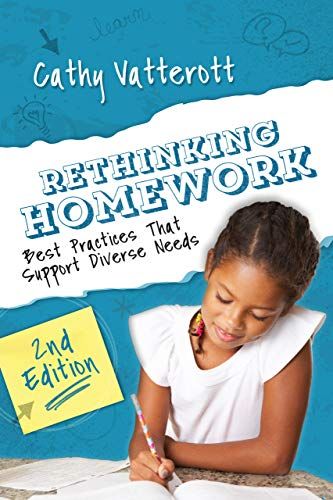
ASCD Rethinking Homework
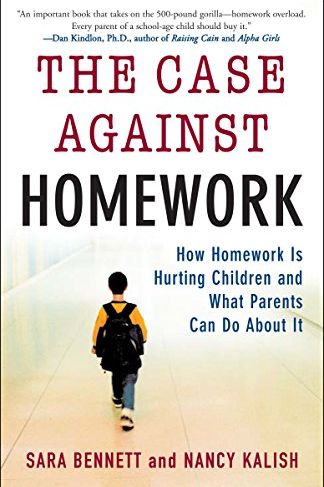
Harmony The Case Against Homework
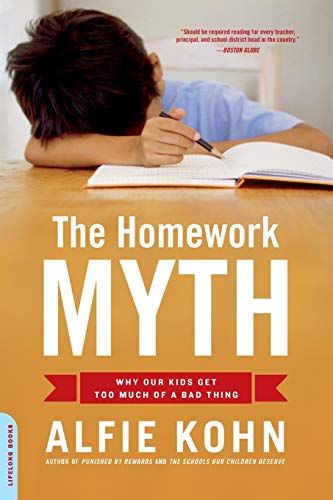
Da Capo Press The Homework Myth
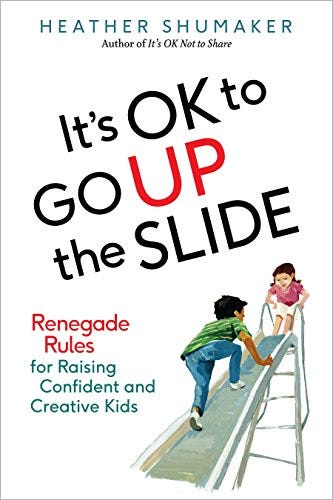
TarcherPerigee It's OK to Go Up the Slide
For can't-miss news, expert beauty advice, genius home solutions, delicious recipes, and lots more, sign up for the Good Housekeeping newsletter .
Subscribe Now

Gail Cornwall is a former public school teacher and recovering lawyer who now works as a stay-at-home mom and writes about parenthood. Born in St. Louis and raised in the Bay Area, she’s a serial monogamist of urban living who resided in Berkeley, New York, DC, Boston, and Seattle before committing to San Francisco. You can find Gail on Facebook and Twitter, or read more at gailcornwall.com.

Back-to-School Season 2024

Amazon Shoppers Love These Reusable Storage Bags

Amazon's Back-to-School Deals for 2024 Are Epic

35 Back-to-School Organization Ideas

Tips for Getting the Kids to School on Time

DIY These Back-to-School Essentials

40 Creative First-Day-of-School Activities

Back-to-School Supply Shopping Lists

The Best Lunch Boxes for Kids

40 Dorm Room Essentials for College Students

The Best Kids Backpacks for the New School Year
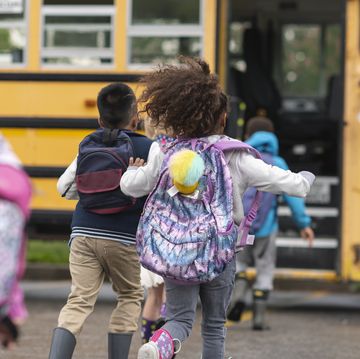
65 Best Back-to-School Quotes

The Best Backpacks You Can Shop on Amazon
More From Forbes
Why homework doesn't seem to boost learning--and how it could.
- Share to Facebook
- Share to Twitter
- Share to Linkedin
Some schools are eliminating homework, citing research showing it doesn’t do much to boost achievement. But maybe teachers just need to assign a different kind of homework.
In 2016, a second-grade teacher in Texas delighted her students—and at least some of their parents—by announcing she would no longer assign homework. “Research has been unable to prove that homework improves student performance,” she explained.
The following year, the superintendent of a Florida school district serving 42,000 students eliminated homework for all elementary students and replaced it with twenty minutes of nightly reading, saying she was basing her decision on “solid research about what works best in improving academic achievement in students.”
Many other elementary schools seem to have quietly adopted similar policies. Critics have objected that even if homework doesn’t increase grades or test scores, it has other benefits, like fostering good study habits and providing parents with a window into what kids are doing in school.
Those arguments have merit, but why doesn’t homework boost academic achievement? The research cited by educators just doesn’t seem to make sense. If a child wants to learn to play the violin, it’s obvious she needs to practice at home between lessons (at least, it’s obvious to an adult). And psychologists have identified a range of strategies that help students learn, many of which seem ideally suited for homework assignments.
For example, there’s something called “ retrieval practice ,” which means trying to recall information you’ve already learned. The optimal time to engage in retrieval practice is not immediately after you’ve acquired information but after you’ve forgotten it a bit—like, perhaps, after school. A homework assignment could require students to answer questions about what was covered in class that day without consulting their notes. Research has found that retrieval practice and similar learning strategies are far more powerful than simply rereading or reviewing material.
One possible explanation for the general lack of a boost from homework is that few teachers know about this research. And most have gotten little training in how and why to assign homework. These are things that schools of education and teacher-prep programs typically don’t teach . So it’s quite possible that much of the homework teachers assign just isn’t particularly effective for many students.
Even if teachers do manage to assign effective homework, it may not show up on the measures of achievement used by researchers—for example, standardized reading test scores. Those tests are designed to measure general reading comprehension skills, not to assess how much students have learned in specific classes. Good homework assignments might have helped a student learn a lot about, say, Ancient Egypt. But if the reading passages on a test cover topics like life in the Arctic or the habits of the dormouse, that student’s test score may well not reflect what she’s learned.
The research relied on by those who oppose homework has actually found it has a modest positive effect at the middle and high school levels—just not in elementary school. But for the most part, the studies haven’t looked at whether it matters what kind of homework is assigned or whether there are different effects for different demographic student groups. Focusing on those distinctions could be illuminating.
A study that looked specifically at math homework , for example, found it boosted achievement more in elementary school than in middle school—just the opposite of the findings on homework in general. And while one study found that parental help with homework generally doesn’t boost students’ achievement—and can even have a negative effect— another concluded that economically disadvantaged students whose parents help with homework improve their performance significantly.
That seems to run counter to another frequent objection to homework, which is that it privileges kids who are already advantaged. Well-educated parents are better able to provide help, the argument goes, and it’s easier for affluent parents to provide a quiet space for kids to work in—along with a computer and internet access . While those things may be true, not assigning homework—or assigning ineffective homework—can end up privileging advantaged students even more.
Students from less educated families are most in need of the boost that effective homework can provide, because they’re less likely to acquire academic knowledge and vocabulary at home. And homework can provide a way for lower-income parents—who often don’t have time to volunteer in class or participate in parents’ organizations—to forge connections to their children’s schools. Rather than giving up on homework because of social inequities, schools could help parents support homework in ways that don’t depend on their own knowledge—for example, by recruiting others to help, as some low-income demographic groups have been able to do . Schools could also provide quiet study areas at the end of the day, and teachers could assign homework that doesn’t rely on technology.
Another argument against homework is that it causes students to feel overburdened and stressed. While that may be true at schools serving affluent populations, students at low-performing ones often don’t get much homework at all—even in high school. One study found that lower-income ninth-graders “consistently described receiving minimal homework—perhaps one or two worksheets or textbook pages, the occasional project, and 30 minutes of reading per night.” And if they didn’t complete assignments, there were few consequences. I discovered this myself when trying to tutor students in writing at a high-poverty high school. After I expressed surprise that none of the kids I was working with had completed a brief writing assignment, a teacher told me, “Oh yeah—I should have told you. Our students don’t really do homework.”
If and when disadvantaged students get to college, their relative lack of study skills and good homework habits can present a serious handicap. After noticing that black and Hispanic students were failing her course in disproportionate numbers, a professor at the University of North Carolina decided to make some changes , including giving homework assignments that required students to quiz themselves without consulting their notes. Performance improved across the board, but especially for students of color and the disadvantaged. The gap between black and white students was cut in half, and the gaps between Hispanic and white students—along with that between first-generation college students and others—closed completely.
There’s no reason this kind of support should wait until students get to college. To be most effective—both in terms of instilling good study habits and building students’ knowledge—homework assignments that boost learning should start in elementary school.
Some argue that young children just need time to chill after a long day at school. But the “ten-minute rule”—recommended by homework researchers—would have first graders doing ten minutes of homework, second graders twenty minutes, and so on. That leaves plenty of time for chilling, and even brief assignments could have a significant impact if they were well-designed.
But a fundamental problem with homework at the elementary level has to do with the curriculum, which—partly because of standardized testing— has narrowed to reading and math. Social studies and science have been marginalized or eliminated, especially in schools where test scores are low. Students spend hours every week practicing supposed reading comprehension skills like “making inferences” or identifying “author’s purpose”—the kinds of skills that the tests try to measure—with little or no attention paid to content.
But as research has established, the most important component in reading comprehension is knowledge of the topic you’re reading about. Classroom time—or homework time—spent on illusory comprehension “skills” would be far better spent building knowledge of the very subjects schools have eliminated. Even if teachers try to take advantage of retrieval practice—say, by asking students to recall what they’ve learned that day about “making comparisons” or “sequence of events”—it won’t have much impact.
If we want to harness the potential power of homework—particularly for disadvantaged students—we’ll need to educate teachers about what kind of assignments actually work. But first, we’ll need to start teaching kids something substantive about the world, beginning as early as possible.
- Editorial Standards
- Reprints & Permissions
Homework – Top 3 Pros and Cons
Pro/Con Arguments | Discussion Questions | Take Action | Sources | More Debates

From dioramas to book reports, from algebraic word problems to research projects, whether students should be given homework, as well as the type and amount of homework, has been debated for over a century. [ 1 ]
While we are unsure who invented homework, we do know that the word “homework” dates back to ancient Rome. Pliny the Younger asked his followers to practice their speeches at home. Memorization exercises as homework continued through the Middle Ages and Enlightenment by monks and other scholars. [ 45 ]
In the 19th century, German students of the Volksschulen or “People’s Schools” were given assignments to complete outside of the school day. This concept of homework quickly spread across Europe and was brought to the United States by Horace Mann , who encountered the idea in Prussia. [ 45 ]
In the early 1900s, progressive education theorists, championed by the magazine Ladies’ Home Journal , decried homework’s negative impact on children’s physical and mental health, leading California to ban homework for students under 15 from 1901 until 1917. In the 1930s, homework was portrayed as child labor, which was newly illegal, but the prevailing argument was that kids needed time to do household chores. [ 1 ] [ 2 ] [ 45 ] [ 46 ]
Public opinion swayed again in favor of homework in the 1950s due to concerns about keeping up with the Soviet Union’s technological advances during the Cold War . And, in 1986, the US government included homework as an educational quality boosting tool. [ 3 ] [ 45 ]
A 2014 study found kindergarteners to fifth graders averaged 2.9 hours of homework per week, sixth to eighth graders 3.2 hours per teacher, and ninth to twelfth graders 3.5 hours per teacher. A 2014-2019 study found that teens spent about an hour a day on homework. [ 4 ] [ 44 ]
Beginning in 2020, the COVID-19 pandemic complicated the very idea of homework as students were schooling remotely and many were doing all school work from home. Washington Post journalist Valerie Strauss asked, “Does homework work when kids are learning all day at home?” While students were mostly back in school buildings in fall 2021, the question remains of how effective homework is as an educational tool. [ 47 ]
Is Homework Beneficial?
Pro 1 Homework improves student achievement. Studies have shown that homework improved student achievement in terms of improved grades, test results, and the likelihood to attend college. Research published in the High School Journal indicated that students who spent between 31 and 90 minutes each day on homework “scored about 40 points higher on the SAT-Mathematics subtest than their peers, who reported spending no time on homework each day, on average.” [ 6 ] Students in classes that were assigned homework outperformed 69% of students who didn’t have homework on both standardized tests and grades. A majority of studies on homework’s impact – 64% in one meta-study and 72% in another – showed that take-home assignments were effective at improving academic achievement. [ 7 ] [ 8 ] Research by the Institute for the Study of Labor (IZA) concluded that increased homework led to better GPAs and higher probability of college attendance for high school boys. In fact, boys who attended college did more than three hours of additional homework per week in high school. [ 10 ] Read More
Pro 2 Homework helps to reinforce classroom learning, while developing good study habits and life skills. Students typically retain only 50% of the information teachers provide in class, and they need to apply that information in order to truly learn it. Abby Freireich and Brian Platzer, co-founders of Teachers Who Tutor NYC, explained, “at-home assignments help students learn the material taught in class. Students require independent practice to internalize new concepts… [And] these assignments can provide valuable data for teachers about how well students understand the curriculum.” [ 11 ] [ 49 ] Elementary school students who were taught “strategies to organize and complete homework,” such as prioritizing homework activities, collecting study materials, note-taking, and following directions, showed increased grades and more positive comments on report cards. [ 17 ] Research by the City University of New York noted that “students who engage in self-regulatory processes while completing homework,” such as goal-setting, time management, and remaining focused, “are generally more motivated and are higher achievers than those who do not use these processes.” [ 18 ] Homework also helps students develop key skills that they’ll use throughout their lives: accountability, autonomy, discipline, time management, self-direction, critical thinking, and independent problem-solving. Freireich and Platzer noted that “homework helps students acquire the skills needed to plan, organize, and complete their work.” [ 12 ] [ 13 ] [ 14 ] [ 15 ] [ 49 ] Read More
Pro 3 Homework allows parents to be involved with children’s learning. Thanks to take-home assignments, parents are able to track what their children are learning at school as well as their academic strengths and weaknesses. [ 12 ] Data from a nationwide sample of elementary school students show that parental involvement in homework can improve class performance, especially among economically disadvantaged African-American and Hispanic students. [ 20 ] Research from Johns Hopkins University found that an interactive homework process known as TIPS (Teachers Involve Parents in Schoolwork) improves student achievement: “Students in the TIPS group earned significantly higher report card grades after 18 weeks (1 TIPS assignment per week) than did non-TIPS students.” [ 21 ] Homework can also help clue parents in to the existence of any learning disabilities their children may have, allowing them to get help and adjust learning strategies as needed. Duke University Professor Harris Cooper noted, “Two parents once told me they refused to believe their child had a learning disability until homework revealed it to them.” [ 12 ] Read More
Con 1 Too much homework can be harmful. A poll of California high school students found that 59% thought they had too much homework. 82% of respondents said that they were “often or always stressed by schoolwork.” High-achieving high school students said too much homework leads to sleep deprivation and other health problems such as headaches, exhaustion, weight loss, and stomach problems. [ 24 ] [ 28 ] [ 29 ] Alfie Kohn, an education and parenting expert, said, “Kids should have a chance to just be kids… it’s absurd to insist that children must be engaged in constructive activities right up until their heads hit the pillow.” [ 27 ] Emmy Kang, a mental health counselor, explained, “More than half of students say that homework is their primary source of stress, and we know what stress can do on our bodies.” [ 48 ] Excessive homework can also lead to cheating: 90% of middle school students and 67% of high school students admit to copying someone else’s homework, and 43% of college students engaged in “unauthorized collaboration” on out-of-class assignments. Even parents take shortcuts on homework: 43% of those surveyed admitted to having completed a child’s assignment for them. [ 30 ] [ 31 ] [ 32 ] Read More
Con 2 Homework exacerbates the digital divide or homework gap. Kiara Taylor, financial expert, defined the digital divide as “the gap between demographics and regions that have access to modern information and communications technology and those that don’t. Though the term now encompasses the technical and financial ability to utilize available technology—along with access (or a lack of access) to the Internet—the gap it refers to is constantly shifting with the development of technology.” For students, this is often called the homework gap. [ 50 ] [ 51 ] 30% (about 15 to 16 million) public school students either did not have an adequate internet connection or an appropriate device, or both, for distance learning. Completing homework for these students is more complicated (having to find a safe place with an internet connection, or borrowing a laptop, for example) or impossible. [ 51 ] A Hispanic Heritage Foundation study found that 96.5% of students across the country needed to use the internet for homework, and nearly half reported they were sometimes unable to complete their homework due to lack of access to the internet or a computer, which often resulted in lower grades. [ 37 ] [ 38 ] One study concluded that homework increases social inequality because it “potentially serves as a mechanism to further advantage those students who already experience some privilege in the school system while further disadvantaging those who may already be in a marginalized position.” [ 39 ] Read More
Con 3 Homework does not help younger students, and may not help high school students. We’ve known for a while that homework does not help elementary students. A 2006 study found that “homework had no association with achievement gains” when measured by standardized tests results or grades. [ 7 ] Fourth grade students who did no homework got roughly the same score on the National Assessment of Educational Progress (NAEP) math exam as those who did 30 minutes of homework a night. Students who did 45 minutes or more of homework a night actually did worse. [ 41 ] Temple University professor Kathryn Hirsh-Pasek said that homework is not the most effective tool for young learners to apply new information: “They’re learning way more important skills when they’re not doing their homework.” [ 42 ] In fact, homework may not be helpful at the high school level either. Alfie Kohn, author of The Homework Myth, stated, “I interviewed high school teachers who completely stopped giving homework and there was no downside, it was all upside.” He explains, “just because the same kids who get more homework do a little better on tests, doesn’t mean the homework made that happen.” [ 52 ] Read More
Discussion Questions
1. Is homework beneficial? Consider the study data, your personal experience, and other types of information. Explain your answer(s).
2. If homework were banned, what other educational strategies would help students learn classroom material? Explain your answer(s).
3. How has homework been helpful to you personally? How has homework been unhelpful to you personally? Make carefully considered lists for both sides.
Take Action
1. Examine an argument in favor of quality homework assignments from Janine Bempechat.
2. Explore Oxford Learning’s infographic on the effects of homework on students.
3. Consider Joseph Lathan’s argument that homework promotes inequality .
4. Consider how you felt about the issue before reading this article. After reading the pros and cons on this topic, has your thinking changed? If so, how? List two to three ways. If your thoughts have not changed, list two to three ways your better understanding of the “other side of the issue” now helps you better argue your position.
5. Push for the position and policies you support by writing US national senators and representatives .
| 1. | Tom Loveless, “Homework in America: Part II of the 2014 Brown Center Report of American Education,” brookings.edu, Mar. 18, 2014 | |
| 2. | Edward Bok, “A National Crime at the Feet of American Parents,” , Jan. 1900 | |
| 3. | Tim Walker, “The Great Homework Debate: What’s Getting Lost in the Hype,” neatoday.org, Sep. 23, 2015 | |
| 4. | University of Phoenix College of Education, “Homework Anxiety: Survey Reveals How Much Homework K-12 Students Are Assigned and Why Teachers Deem It Beneficial,” phoenix.edu, Feb. 24, 2014 | |
| 5. | Organization for Economic Cooperation and Development (OECD), “PISA in Focus No. 46: Does Homework Perpetuate Inequities in Education?,” oecd.org, Dec. 2014 | |
| 6. | Adam V. Maltese, Robert H. Tai, and Xitao Fan, “When is Homework Worth the Time?: Evaluating the Association between Homework and Achievement in High School Science and Math,” , 2012 | |
| 7. | Harris Cooper, Jorgianne Civey Robinson, and Erika A. Patall, “Does Homework Improve Academic Achievement? A Synthesis of Researcher, 1987-2003,” , 2006 | |
| 8. | Gökhan Bas, Cihad Sentürk, and Fatih Mehmet Cigerci, “Homework and Academic Achievement: A Meta-Analytic Review of Research,” , 2017 | |
| 9. | Huiyong Fan, Jianzhong Xu, Zhihui Cai, Jinbo He, and Xitao Fan, “Homework and Students’ Achievement in Math and Science: A 30-Year Meta-Analysis, 1986-2015,” , 2017 | |
| 10. | Charlene Marie Kalenkoski and Sabrina Wulff Pabilonia, “Does High School Homework Increase Academic Achievement?,” iza.og, Apr. 2014 | |
| 11. | Ron Kurtus, “Purpose of Homework,” school-for-champions.com, July 8, 2012 | |
| 12. | Harris Cooper, “Yes, Teachers Should Give Homework – The Benefits Are Many,” newsobserver.com, Sep. 2, 2016 | |
| 13. | Tammi A. Minke, “Types of Homework and Their Effect on Student Achievement,” repository.stcloudstate.edu, 2017 | |
| 14. | LakkshyaEducation.com, “How Does Homework Help Students: Suggestions From Experts,” LakkshyaEducation.com (accessed Aug. 29, 2018) | |
| 15. | University of Montreal, “Do Kids Benefit from Homework?,” teaching.monster.com (accessed Aug. 30, 2018) | |
| 16. | Glenda Faye Pryor-Johnson, “Why Homework Is Actually Good for Kids,” memphisparent.com, Feb. 1, 2012 | |
| 17. | Joan M. Shepard, “Developing Responsibility for Completing and Handing in Daily Homework Assignments for Students in Grades Three, Four, and Five,” eric.ed.gov, 1999 | |
| 18. | Darshanand Ramdass and Barry J. Zimmerman, “Developing Self-Regulation Skills: The Important Role of Homework,” , 2011 | |
| 19. | US Department of Education, “Let’s Do Homework!,” ed.gov (accessed Aug. 29, 2018) | |
| 20. | Loretta Waldman, “Sociologist Upends Notions about Parental Help with Homework,” phys.org, Apr. 12, 2014 | |
| 21. | Frances L. Van Voorhis, “Reflecting on the Homework Ritual: Assignments and Designs,” , June 2010 | |
| 22. | Roel J. F. J. Aries and Sofie J. Cabus, “Parental Homework Involvement Improves Test Scores? A Review of the Literature,” , June 2015 | |
| 23. | Jamie Ballard, “40% of People Say Elementary School Students Have Too Much Homework,” yougov.com, July 31, 2018 | |
| 24. | Stanford University, “Stanford Survey of Adolescent School Experiences Report: Mira Costa High School, Winter 2017,” stanford.edu, 2017 | |
| 25. | Cathy Vatterott, “Rethinking Homework: Best Practices That Support Diverse Needs,” ascd.org, 2009 | |
| 26. | End the Race, “Homework: You Can Make a Difference,” racetonowhere.com (accessed Aug. 24, 2018) | |
| 27. | Elissa Strauss, “Opinion: Your Kid Is Right, Homework Is Pointless. Here’s What You Should Do Instead.,” cnn.com, Jan. 28, 2020 | |
| 28. | Jeanne Fratello, “Survey: Homework Is Biggest Source of Stress for Mira Costa Students,” digmb.com, Dec. 15, 2017 | |
| 29. | Clifton B. Parker, “Stanford Research Shows Pitfalls of Homework,” stanford.edu, Mar. 10, 2014 | |
| 30. | AdCouncil, “Cheating Is a Personal Foul: Academic Cheating Background,” glass-castle.com (accessed Aug. 16, 2018) | |
| 31. | Jeffrey R. Young, “High-Tech Cheating Abounds, and Professors Bear Some Blame,” chronicle.com, Mar. 28, 2010 | |
| 32. | Robin McClure, “Do You Do Your Child’s Homework?,” verywellfamily.com, Mar. 14, 2018 | |
| 33. | Robert M. Pressman, David B. Sugarman, Melissa L. Nemon, Jennifer, Desjarlais, Judith A. Owens, and Allison Schettini-Evans, “Homework and Family Stress: With Consideration of Parents’ Self Confidence, Educational Level, and Cultural Background,” , 2015 | |
| 34. | Heather Koball and Yang Jiang, “Basic Facts about Low-Income Children,” nccp.org, Jan. 2018 | |
| 35. | Meagan McGovern, “Homework Is for Rich Kids,” huffingtonpost.com, Sep. 2, 2016 | |
| 36. | H. Richard Milner IV, “Not All Students Have Access to Homework Help,” nytimes.com, Nov. 13, 2014 | |
| 37. | Claire McLaughlin, “The Homework Gap: The ‘Cruelest Part of the Digital Divide’,” neatoday.org, Apr. 20, 2016 | |
| 38. | Doug Levin, “This Evening’s Homework Requires the Use of the Internet,” edtechstrategies.com, May 1, 2015 | |
| 39. | Amy Lutz and Lakshmi Jayaram, “Getting the Homework Done: Social Class and Parents’ Relationship to Homework,” , June 2015 | |
| 40. | Sandra L. Hofferth and John F. Sandberg, “How American Children Spend Their Time,” psc.isr.umich.edu, Apr. 17, 2000 | |
| 41. | Alfie Kohn, “Does Homework Improve Learning?,” alfiekohn.org, 2006 | |
| 42. | Patrick A. Coleman, “Elementary School Homework Probably Isn’t Good for Kids,” fatherly.com, Feb. 8, 2018 | |
| 43. | Valerie Strauss, “Why This Superintendent Is Banning Homework – and Asking Kids to Read Instead,” washingtonpost.com, July 17, 2017 | |
| 44. | Pew Research Center, “The Way U.S. Teens Spend Their Time Is Changing, but Differences between Boys and Girls Persist,” pewresearch.org, Feb. 20, 2019 | |
| 45. | ThroughEducation, “The History of Homework: Why Was It Invented and Who Was behind It?,” , Feb. 14, 2020 | |
| 46. | History, “Why Homework Was Banned,” (accessed Feb. 24, 2022) | |
| 47. | Valerie Strauss, “Does Homework Work When Kids Are Learning All Day at Home?,” , Sep. 2, 2020 | |
| 48. | Sara M Moniuszko, “Is It Time to Get Rid of Homework? Mental Health Experts Weigh In,” , Aug. 17, 2021 | |
| 49. | Abby Freireich and Brian Platzer, “The Worsening Homework Problem,” , Apr. 13, 2021 | |
| 50. | Kiara Taylor, “Digital Divide,” , Feb. 12, 2022 | |
| 51. | Marguerite Reardon, “The Digital Divide Has Left Millions of School Kids Behind,” , May 5, 2021 | |
| 52. | Rachel Paula Abrahamson, “Why More and More Teachers Are Joining the Anti-Homework Movement,” , Sep. 10, 2021 |
More School Debate Topics
Should K-12 Students Dissect Animals in Science Classrooms? – Proponents say dissecting real animals is a better learning experience. Opponents say the practice is bad for the environment.
Should Students Have to Wear School Uniforms? – Proponents say uniforms may increase student safety. Opponents say uniforms restrict expression.
Should Corporal Punishment Be Used in K-12 Schools? – Proponents say corporal punishment is an appropriate discipline. Opponents say it inflicts long-lasting physical and mental harm on students.
ProCon/Encyclopaedia Britannica, Inc. 325 N. LaSalle Street, Suite 200 Chicago, Illinois 60654 USA
Natalie Leppard Managing Editor [email protected]
© 2023 Encyclopaedia Britannica, Inc. All rights reserved
- Social Media
- Death Penalty
- School Uniforms
- Video Games
- Animal Testing
- Gun Control
- Banned Books
- Teachers’ Corner
Cite This Page
ProCon.org is the institutional or organization author for all ProCon.org pages. Proper citation depends on your preferred or required style manual. Below are the proper citations for this page according to four style manuals (in alphabetical order): the Modern Language Association Style Manual (MLA), the Chicago Manual of Style (Chicago), the Publication Manual of the American Psychological Association (APA), and Kate Turabian's A Manual for Writers of Term Papers, Theses, and Dissertations (Turabian). Here are the proper bibliographic citations for this page according to four style manuals (in alphabetical order):
[Editor's Note: The APA citation style requires double spacing within entries.]
[Editor’s Note: The MLA citation style requires double spacing within entries.]
- Grades 6-12
- School Leaders
Have you seen our latest free teacher workshop?
Dear Parents: Please Stop Asking Teachers To Give Your Kids Homework
If your kid’s teacher isn’t assigning homework, it’s for a good reason.

If I could change one thing about my past teaching, it would be homework. As in, I would never assign it. I’m just not convinced that the positives outweigh the negatives, and I’m not alone. Many teachers (even entire districts) are getting on the no homework train. Not everyone agrees, and some of the most vocal opponents of homework bans are parents. In fact, many parents seem to positively associate homework with teacher and/or school quality. I have school-age kids, and I can understand the discomfort around uprooting tradition. But since when has “that’s the way we’ve always done it” been a good reason to continue with a practice? Fellow parents, it’s time to take a long, hard look at homework.
Homework just isn’t that beneficial
Repeat after me: There is no conclusive evidence that homework improves student achievement. The research (not to mention how it gets interpreted) is mixed at best. But what stands out to me from the research is this: There is no correlation between academic achievement and homework for elementary students and a moderate correlation for middle and high school, which diminishes as more homework is assigned. So while you can probably make a case that there are benefits for older students doing homework (but no more than one and a half to two hours a day), there’s no reason your kindergartner should be coming home with it.
There are other ways of finding out what your child is learning
“How else am I supposed to know what they’re teaching my child?” It’s a valid concern. But homework isn’t your only window into what your child is learning. Familiarize yourself with the standards for your child’s grade level, which are readily available online. You can also learn about what’s normal for your child’s age (cognitively, social-emotionally, and physically) with a book like Yardsticks . Make sure you read the communications that come home via class newsletters or are posted by your child’s teacher on school apps, as those typically have “what we’re working on” information. Reviewing the corrected work that comes home is also a great way to see what’s being taught and how your child is performing.
Parents aren’t experts on content or pedagogy
You are your child’s first teacher, and that’s important. However, unless you have an education degree, you don’t have the same level of expertise as a trained teacher. Non-teachers sometimes make the mistake of assuming that because they went to school, they know how a classroom should be run. And that’s just not the case. You have only to attempt “new math” to see that. So another benefit of not sending homework home is somewhat of a protective one. For example, we don’t want you introducing the traditional algorithm for addition with regrouping before we’ve had a chance to ensure that our students understand what’s going on mathematically in the process using manipulatives and visuals.
It sets kids up for poor work-life balance
Given its lack of proven benefit, homework is an unnecessary stressor. And it is stressful. Stephanie Donaldson-Pressman , clinical director of the New England Center for Pediatric Psychology and contributing editor to a study on homework, cites “a plethora of evidence that it’s detrimental to their attitude about school, their grades, their self-confidence, their social skills, and their quality of life.” It also sends the message to kids that it’s normal to work after school hours, setting them up for having their boundaries abused when they enter the workplace.
Homework is a burden on many families
If you’re a parent who’s clamoring for more homework, try to remember that not all families are in the same situation as you. Many parents are concerned with meeting their families’ basic needs. Not everyone works a 9-5 schedule. Even for those who do, not all of us are thrilled about coming home after a long day at work and having to fight with our kids to get their homework done (much less complete some elaborate science project or book report diorama that we all know they’re not doing on their own). By pushing your own agenda, you’re potentially marginalizing other families in your own school community. If it’s that important to you, come up with your own, but don’t drag everyone else with you.
What families can spend their time on instead
- Reading to and with your children and listening to them read
- Encouraging them to pursue passion projects
- Providing space for unstructured play
- Participating in extra-curricular activities that boost social-emotional skills and well-roundedness
- Eating dinner together as a family
- Keeping consistent bedtime routines that help everyone get a good night’s sleep so they are ready to work and learn the next day
To find out when more open letters like this are posted, sign up for our newsletters !
Plus, check out dear parents, please remember we’re on the same team ..

You Might Also Like
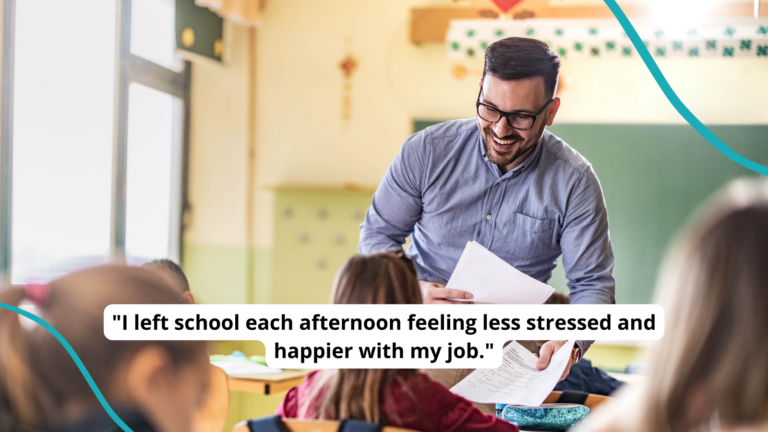
My Teacher Happiness Soared After This District-Wide Schedule Change
At first I was skeptical, but the payoff was huge. Continue Reading
Copyright © 2024. All rights reserved. 5335 Gate Parkway, Jacksonville, FL 32256

Nix Homework to Help Students? What the Science Says

A Texas teacher's note to parents about her newly implemented "no formal homework policy" in her second-grade class went viral last week, opening up the floodgates for parents, teachers and school administrators to weigh in on this controversial topic.
In the note, teacher Brandy Young told parents that her students' only homework would be work that they did not finish during the school day.
Instead of having kids spend time on homework , parents should "spend your evenings doing things that are proven to correlate with student success," Young said. She recommended that parents " eat dinner as a family , read together, play outside and get your child to bed early," strategies that she suggests are more closely tied to a child's success in the classroom than doing homework.
Young's rationale for her new policy, as she explained in her note, was that "research has been unable to prove that homework improves student performance." [ 10 Scientific Tips for Raising Happy Kids ]
Live Science spoke with three educators who have conducted research on homework and student performance to fact-check this statement, and to find out what studies have shown about homework's positive and negative effects.
Keys to student success
It's accurate to suggest that studies have found no correlation between homework in elementary school and a student's academic performance , but there is one important exception worth mentioning, said Denise Pope, a senior lecturer at the Stanford University Graduate School of Education.
Sign up for the Live Science daily newsletter now
Get the world’s most fascinating discoveries delivered straight to your inbox.
Research has shown that free reading , or allowing students to read whatever books they want, does improve their academic performance, Pope said. Some elementary school teachers assign free reading as homework, but kids and parents do not always perceive these assignments as true homework that must be completed, she explained. [ Best Science-y Books for Kids ]
In middle school, the evidence shows a slight correlation between doing homework and academic achievement , but further improvement fades after a middle-school student has spent 60 to 90 minutes a night doing homework, said Pope, who is also the co-founder of Challenge Success, an organization that works with schools and families to develop research-based strategies that engage kids and keep them healthy.
But it's tricky to draw conclusions from homework studies, because these studies use such varied ways of measuring a student's academic performance, Pope said. Some researchers use standardized test scores to measure achievement, while others use students' grade-point averages, she said.

Another variable that can complicate the results of homework studies is that it's hard to know who is actually doing the assignment when it's taken home, Pope said. For example, a student could get help from a parent , tutor, sibling or classmate to complete the work.
In high school, there is a strong correlation between students who do 2 hours of homework a night and higher levels of academic achievement, but again, this improvement fades when students exceed the 2-hour threshold, Pope told Live Science. [ Top 5 Benefits of Play ]
Pope said she considers the advice that the viral note offered to parents —to eat dinner as a family, read together, play outside and get a child to bed early — to be "spot on." She added that there is "really good research" to correlate these four variables with student success.
Studies suggest that to perform at their best in school, kids in second grade need sufficient sleep , playtime with their siblings and friends, and downtime, meaning time to transition from school to home. Kids also benefit from regular family time, which ideally takes place five times a week for at least 25 minutes and could take the form of a family meal, Pope said. Making time for reading is also important for a child's success in the classroom, she said.
Learning through practice
But not all educators share Pope's opinions of a no-homework policy for second graders.
The contention that "research is unable to prove that homework improves student performance" is an overstatement, said Harris Cooper, a professor of psychology and neuroscience at Duke University in Durham, North Carolina, who has been researching homework and student performance for 30 years.
"Even in kids as young as age 7, research shows that homework in particular areas can help students learn, especially things children need to learn through practice," said Cooper, the author of "The Battle Over Homework" (Corwin, 2006).
Even when looking at levels as early as second grade, studies have found that kids who study a little bit at home may do better on spelling, vocabulary and math tests given in the classroom, Cooper told Live Science. However, he noted that the correlation between doing homework and higher academic achievement is not as strong in elementary students, who generally don't get much homework, as it is in middle-school and high-school students.
Rather than a no-homework policy for second graders, Cooper said he would recommend that homework for kids at this age be kept short and simple. It should take no more than about 20 minutes a night for second graders to complete their homework, he said.

To estimate an appropriate amount of time for students to spend doing homework, educators may use "the 10-minute rule" which means multiplying a child's grade level by 10 minutes of homework a night, Cooper explained. That means first graders get 10 minutes of homework, second graders get 20 and so on.
Besides just the skills in math, reading or other subjects themselves, homework can have positive effects on children's time-management and study skills, Cooper said. It can also help keep parents informed of what children are learning at school, and help make Mom and Dad aware of their child's strengths and weaknesses, he said.
But too much homework in second grade or assignments that are too hard can have a negative impact on young learners, Cooper said. "The last thing you want is for a 7-year-old to be bored [or] frustrated, or think that he or she is not good in school," he added.
Some parents who are extremely concerned about ensuring that their children achieve to their maximal ability may put pressure on educators, and this has led some teachers to assign students too much homework, especially at the high-school level, Cooper said.
But the key is for students to get the right amount of homework — not too much of it and not too little — so that it can have positive effects on learning and school performance, Cooper said.
Homework and family life
But other educators are steadfast that the right amount of homework in elementary school may be little to none.
Research suggests that homework in elementary school does not have a positive effect on student achievement, and could even have a negative impact, said Etta Kralovec, an associate professor of teacher education at the University of Arizona South, and the author of "The End of Homework" (Beacon Press, 2001).
The findings are more complex in middle- and high-school students, with many studies finding a correlation between classroom grades and homework, Kralovec said. But these results could also raise additional questions, because tracking students — separating them into lower-level and advanced-level classes, for example — also begins at these grades, and kids in the higher-track classes are often assigned more homework.
It may not be that homework actually causes students to get better grades in high school or middle school, it could be that students who do more homework were better students to begin with, Kralovec said.

It's also hard to know how much actual time students truly spend on homework, because most research relies on self-reported data from students, parents or teachers, Kralovec said. The amount of time a student reports spending on homework can differ from a parent's report of it, and it can also differ from the amount of time a teacher estimates students will need in order to complete the assignment, Kralovec explained.
Despite the research, the amount of time students spend doing homework remains a highly contentious topic in education, Kralovec told Live Science. And when a teacher's short note to parents about a no-homework policy goes viral, it shows that this topic has hit a very important nerve in the American family experience, she said.
Family life today is really challenging compared with decades past — with more working mothers and some parents working two or three jobs to make ends meet — and homework can add yet another stressor to the mix, Kralovec said.
If parents feel that the amount of homework students receive is too much and may be encroaching on family time, one strategy they may try is to get organized with other parents, Kralovec suggested.
Each school district may set its own policies about the amount of homework given to students. When parents have banded together in their communities, they have often been successful at having public discussions with administrators and teachers, and even moving assignment levels back to healthier levels, she said.
Originally published on Live Science .
Cari Nierenberg has been writing about health and wellness topics for online news outlets and print publications for more than two decades. Her work has been published by Live Science, The Washington Post, WebMD, Scientific American, among others. She has a Bachelor of Science degree in nutrition from Cornell University and a Master of Science degree in Nutrition and Communication from Boston University.
Horse domestication didn't happen the way we think it did
50,000 'knots' scattered throughout our DNA control gene activity
Ancient Egyptian head cones: Mysterious headgear that could be related to sensuality and fertility rituals
Most Popular
- 2 50,000 'knots' scattered throughout our DNA control gene activity
- 3 Ancient Egyptian head cones: Mysterious headgear that could be related to sensuality and fertility rituals
- 4 Possible 'mega' fort found in Wales hints at tension between Romans and Celtics
- 5 Silver is being buried beneath the sea, and it's all because of climate change, study finds
Does Homework Really Help Students Learn?
A conversation with a Wheelock researcher, a BU student, and a fourth-grade teacher

“Quality homework is engaging and relevant to kids’ lives,” says Wheelock’s Janine Bempechat. “It gives them autonomy and engages them in the community and with their families. In some subjects, like math, worksheets can be very helpful. It has to do with the value of practicing over and over.” Photo by iStock/Glenn Cook Photography
Do your homework.
If only it were that simple.
Educators have debated the merits of homework since the late 19th century. In recent years, amid concerns of some parents and teachers that children are being stressed out by too much homework, things have only gotten more fraught.
“Homework is complicated,” says developmental psychologist Janine Bempechat, a Wheelock College of Education & Human Development clinical professor. The author of the essay “ The Case for (Quality) Homework—Why It Improves Learning and How Parents Can Help ” in the winter 2019 issue of Education Next , Bempechat has studied how the debate about homework is influencing teacher preparation, parent and student beliefs about learning, and school policies.
She worries especially about socioeconomically disadvantaged students from low-performing schools who, according to research by Bempechat and others, get little or no homework.
BU Today sat down with Bempechat and Erin Bruce (Wheelock’17,’18), a new fourth-grade teacher at a suburban Boston school, and future teacher freshman Emma Ardizzone (Wheelock) to talk about what quality homework looks like, how it can help children learn, and how schools can equip teachers to design it, evaluate it, and facilitate parents’ role in it.
BU Today: Parents and educators who are against homework in elementary school say there is no research definitively linking it to academic performance for kids in the early grades. You’ve said that they’re missing the point.
Bempechat : I think teachers assign homework in elementary school as a way to help kids develop skills they’ll need when they’re older—to begin to instill a sense of responsibility and to learn planning and organizational skills. That’s what I think is the greatest value of homework—in cultivating beliefs about learning and skills associated with academic success. If we greatly reduce or eliminate homework in elementary school, we deprive kids and parents of opportunities to instill these important learning habits and skills.
We do know that beginning in late middle school, and continuing through high school, there is a strong and positive correlation between homework completion and academic success.
That’s what I think is the greatest value of homework—in cultivating beliefs about learning and skills associated with academic success.
You talk about the importance of quality homework. What is that?
Quality homework is engaging and relevant to kids’ lives. It gives them autonomy and engages them in the community and with their families. In some subjects, like math, worksheets can be very helpful. It has to do with the value of practicing over and over.

What are your concerns about homework and low-income children?
The argument that some people make—that homework “punishes the poor” because lower-income parents may not be as well-equipped as affluent parents to help their children with homework—is very troubling to me. There are no parents who don’t care about their children’s learning. Parents don’t actually have to help with homework completion in order for kids to do well. They can help in other ways—by helping children organize a study space, providing snacks, being there as a support, helping children work in groups with siblings or friends.
Isn’t the discussion about getting rid of homework happening mostly in affluent communities?
Yes, and the stories we hear of kids being stressed out from too much homework—four or five hours of homework a night—are real. That’s problematic for physical and mental health and overall well-being. But the research shows that higher-income students get a lot more homework than lower-income kids.
Teachers may not have as high expectations for lower-income children. Schools should bear responsibility for providing supports for kids to be able to get their homework done—after-school clubs, community support, peer group support. It does kids a disservice when our expectations are lower for them.
The conversation around homework is to some extent a social class and social justice issue. If we eliminate homework for all children because affluent children have too much, we’re really doing a disservice to low-income children. They need the challenge, and every student can rise to the challenge with enough supports in place.
What did you learn by studying how education schools are preparing future teachers to handle homework?
My colleague, Margarita Jimenez-Silva, at the University of California, Davis, School of Education, and I interviewed faculty members at education schools, as well as supervising teachers, to find out how students are being prepared. And it seemed that they weren’t. There didn’t seem to be any readings on the research, or conversations on what high-quality homework is and how to design it.
Erin, what kind of training did you get in handling homework?
Bruce : I had phenomenal professors at Wheelock, but homework just didn’t come up. I did lots of student teaching. I’ve been in classrooms where the teachers didn’t assign any homework, and I’ve been in rooms where they assigned hours of homework a night. But I never even considered homework as something that was my decision. I just thought it was something I’d pull out of a book and it’d be done.
I started giving homework on the first night of school this year. My first assignment was to go home and draw a picture of the room where you do your homework. I want to know if it’s at a table and if there are chairs around it and if mom’s cooking dinner while you’re doing homework.
The second night I asked them to talk to a grown-up about how are you going to be able to get your homework done during the week. The kids really enjoyed it. There’s a running joke that I’m teaching life skills.
Friday nights, I read all my kids’ responses to me on their homework from the week and it’s wonderful. They pour their hearts out. It’s like we’re having a conversation on my couch Friday night.
It matters to know that the teacher cares about you and that what you think matters to the teacher. Homework is a vehicle to connect home and school…for parents to know teachers are welcoming to them and their families.
Bempechat : I can’t imagine that most new teachers would have the intuition Erin had in designing homework the way she did.
Ardizzone : Conversations with kids about homework, feeling you’re being listened to—that’s such a big part of wanting to do homework….I grew up in Westchester County. It was a pretty demanding school district. My junior year English teacher—I loved her—she would give us feedback, have meetings with all of us. She’d say, “If you have any questions, if you have anything you want to talk about, you can talk to me, here are my office hours.” It felt like she actually cared.
Bempechat : It matters to know that the teacher cares about you and that what you think matters to the teacher. Homework is a vehicle to connect home and school…for parents to know teachers are welcoming to them and their families.
Ardizzone : But can’t it lead to parents being overbearing and too involved in their children’s lives as students?
Bempechat : There’s good help and there’s bad help. The bad help is what you’re describing—when parents hover inappropriately, when they micromanage, when they see their children confused and struggling and tell them what to do.
Good help is when parents recognize there’s a struggle going on and instead ask informative questions: “Where do you think you went wrong?” They give hints, or pointers, rather than saying, “You missed this,” or “You didn’t read that.”
Bruce : I hope something comes of this. I hope BU or Wheelock can think of some way to make this a more pressing issue. As a first-year teacher, it was not something I even thought about on the first day of school—until a kid raised his hand and said, “Do we have homework?” It would have been wonderful if I’d had a plan from day one.
Explore Related Topics:
- Share this story
Senior Contributing Editor

Sara Rimer A journalist for more than three decades, Sara Rimer worked at the Miami Herald , Washington Post and, for 26 years, the New York Times , where she was the New England bureau chief, and a national reporter covering education, aging, immigration, and other social justice issues. Her stories on the death penalty’s inequities were nominated for a Pulitzer Prize and cited in the U.S. Supreme Court’s decision outlawing the execution of people with intellectual disabilities. Her journalism honors include Columbia University’s Meyer Berger award for in-depth human interest reporting. She holds a BA degree in American Studies from the University of Michigan. Profile
She can be reached at [email protected] .
Comments & Discussion
Boston University moderates comments to facilitate an informed, substantive, civil conversation. Abusive, profane, self-promotional, misleading, incoherent or off-topic comments will be rejected. Moderators are staffed during regular business hours (EST) and can only accept comments written in English. Statistics or facts must include a citation or a link to the citation.
There are 81 comments on Does Homework Really Help Students Learn?
Insightful! The values about homework in elementary schools are well aligned with my intuition as a parent.
when i finish my work i do my homework and i sometimes forget what to do because i did not get enough sleep
same omg it does not help me it is stressful and if I have it in more than one class I hate it.
Same I think my parent wants to help me but, she doesn’t care if I get bad grades so I just try my best and my grades are great.
I think that last question about Good help from parents is not know to all parents, we do as our parents did or how we best think it can be done, so maybe coaching parents or giving them resources on how to help with homework would be very beneficial for the parent on how to help and for the teacher to have consistency and improve homework results, and of course for the child. I do see how homework helps reaffirm the knowledge obtained in the classroom, I also have the ability to see progress and it is a time I share with my kids
The answer to the headline question is a no-brainer – a more pressing problem is why there is a difference in how students from different cultures succeed. Perfect example is the student population at BU – why is there a majority population of Asian students and only about 3% black students at BU? In fact at some universities there are law suits by Asians to stop discrimination and quotas against admitting Asian students because the real truth is that as a group they are demonstrating better qualifications for admittance, while at the same time there are quotas and reduced requirements for black students to boost their portion of the student population because as a group they do more poorly in meeting admissions standards – and it is not about the Benjamins. The real problem is that in our PC society no one has the gazuntas to explore this issue as it may reveal that all people are not created equal after all. Or is it just environmental cultural differences??????
I get you have a concern about the issue but that is not even what the point of this article is about. If you have an issue please take this to the site we have and only post your opinion about the actual topic
This is not at all what the article is talking about.
This literally has nothing to do with the article brought up. You should really take your opinions somewhere else before you speak about something that doesn’t make sense.
we have the same name
so they have the same name what of it?
lol you tell her
totally agree
What does that have to do with homework, that is not what the article talks about AT ALL.
Yes, I think homework plays an important role in the development of student life. Through homework, students have to face challenges on a daily basis and they try to solve them quickly.I am an intense online tutor at 24x7homeworkhelp and I give homework to my students at that level in which they handle it easily.
More than two-thirds of students said they used alcohol and drugs, primarily marijuana, to cope with stress.
You know what’s funny? I got this assignment to write an argument for homework about homework and this article was really helpful and understandable, and I also agree with this article’s point of view.
I also got the same task as you! I was looking for some good resources and I found this! I really found this article useful and easy to understand, just like you! ^^
i think that homework is the best thing that a child can have on the school because it help them with their thinking and memory.
I am a child myself and i think homework is a terrific pass time because i can’t play video games during the week. It also helps me set goals.
Homework is not harmful ,but it will if there is too much
I feel like, from a minors point of view that we shouldn’t get homework. Not only is the homework stressful, but it takes us away from relaxing and being social. For example, me and my friends was supposed to hang at the mall last week but we had to postpone it since we all had some sort of work to do. Our minds shouldn’t be focused on finishing an assignment that in realty, doesn’t matter. I completely understand that we should have homework. I have to write a paper on the unimportance of homework so thanks.
homework isn’t that bad
Are you a student? if not then i don’t really think you know how much and how severe todays homework really is
i am a student and i do not enjoy homework because i practice my sport 4 out of the five days we have school for 4 hours and that’s not even counting the commute time or the fact i still have to shower and eat dinner when i get home. its draining!
i totally agree with you. these people are such boomers
why just why
they do make a really good point, i think that there should be a limit though. hours and hours of homework can be really stressful, and the extra work isn’t making a difference to our learning, but i do believe homework should be optional and extra credit. that would make it for students to not have the leaning stress of a assignment and if you have a low grade you you can catch up.
Studies show that homework improves student achievement in terms of improved grades, test results, and the likelihood to attend college. Research published in the High School Journal indicates that students who spent between 31 and 90 minutes each day on homework “scored about 40 points higher on the SAT-Mathematics subtest than their peers, who reported spending no time on homework each day, on average.” On both standardized tests and grades, students in classes that were assigned homework outperformed 69% of students who didn’t have homework. A majority of studies on homework’s impact – 64% in one meta-study and 72% in another – showed that take home assignments were effective at improving academic achievement. Research by the Institute for the Study of Labor (IZA) concluded that increased homework led to better GPAs and higher probability of college attendance for high school boys. In fact, boys who attended college did more than three hours of additional homework per week in high school.
So how are your measuring student achievement? That’s the real question. The argument that doing homework is simply a tool for teaching responsibility isn’t enough for me. We can teach responsibility in a number of ways. Also the poor argument that parents don’t need to help with homework, and that students can do it on their own, is wishful thinking at best. It completely ignores neurodiverse students. Students in poverty aren’t magically going to find a space to do homework, a friend’s or siblings to help them do it, and snacks to eat. I feel like the author of this piece has never set foot in a classroom of students.
THIS. This article is pathetic coming from a university. So intellectually dishonest, refusing to address the havoc of capitalism and poverty plays on academic success in life. How can they in one sentence use poor kids in an argument and never once address that poor children have access to damn near 0 of the resources affluent kids have? Draw me a picture and let’s talk about feelings lmao what a joke is that gonna put food in their belly so they can have the calories to burn in order to use their brain to study? What about quiet their 7 other siblings that they share a single bedroom with for hours? Is it gonna force the single mom to magically be at home and at work at the same time to cook food while you study and be there to throw an encouraging word?
Also the “parents don’t need to be a parent and be able to guide their kid at all academically they just need to exist in the next room” is wild. Its one thing if a parent straight up is not equipped but to say kids can just figured it out is…. wow coming from an educator What’s next the teacher doesn’t need to teach cause the kid can just follow the packet and figure it out?
Well then get a tutor right? Oh wait you are poor only affluent kids can afford a tutor for their hours of homework a day were they on average have none of the worries a poor child does. Does this address that poor children are more likely to also suffer abuse and mental illness? Like mentioned what about kids that can’t learn or comprehend the forced standardized way? Just let em fail? These children regularly are not in “special education”(some of those are a joke in their own and full of neglect and abuse) programs cause most aren’t even acknowledged as having disabilities or disorders.
But yes all and all those pesky poor kids just aren’t being worked hard enough lol pretty sure poor children’s existence just in childhood is more work, stress, and responsibility alone than an affluent child’s entire life cycle. Love they never once talked about the quality of education in the classroom being so bad between the poor and affluent it can qualify as segregation, just basically blamed poor people for being lazy, good job capitalism for failing us once again!
why the hell?
you should feel bad for saying this, this article can be helpful for people who has to write a essay about it
This is more of a political rant than it is about homework
I know a teacher who has told his students their homework is to find something they are interested in, pursue it and then come share what they learn. The student responses are quite compelling. One girl taught herself German so she could talk to her grandfather. One boy did a research project on Nelson Mandela because the teacher had mentioned him in class. Another boy, a both on the autism spectrum, fixed his family’s computer. The list goes on. This is fourth grade. I think students are highly motivated to learn, when we step aside and encourage them.
The whole point of homework is to give the students a chance to use the material that they have been presented with in class. If they never have the opportunity to use that information, and discover that it is actually useful, it will be in one ear and out the other. As a science teacher, it is critical that the students are challenged to use the material they have been presented with, which gives them the opportunity to actually think about it rather than regurgitate “facts”. Well designed homework forces the student to think conceptually, as opposed to regurgitation, which is never a pretty sight
Wonderful discussion. and yes, homework helps in learning and building skills in students.
not true it just causes kids to stress
Homework can be both beneficial and unuseful, if you will. There are students who are gifted in all subjects in school and ones with disabilities. Why should the students who are gifted get the lucky break, whereas the people who have disabilities suffer? The people who were born with this “gift” go through school with ease whereas people with disabilities struggle with the work given to them. I speak from experience because I am one of those students: the ones with disabilities. Homework doesn’t benefit “us”, it only tears us down and put us in an abyss of confusion and stress and hopelessness because we can’t learn as fast as others. Or we can’t handle the amount of work given whereas the gifted students go through it with ease. It just brings us down and makes us feel lost; because no mater what, it feels like we are destined to fail. It feels like we weren’t “cut out” for success.
homework does help
here is the thing though, if a child is shoved in the face with a whole ton of homework that isn’t really even considered homework it is assignments, it’s not helpful. the teacher should make homework more of a fun learning experience rather than something that is dreaded
This article was wonderful, I am going to ask my teachers about extra, or at all giving homework.
I agree. Especially when you have homework before an exam. Which is distasteful as you’ll need that time to study. It doesn’t make any sense, nor does us doing homework really matters as It’s just facts thrown at us.
Homework is too severe and is just too much for students, schools need to decrease the amount of homework. When teachers assign homework they forget that the students have other classes that give them the same amount of homework each day. Students need to work on social skills and life skills.
I disagree.
Beyond achievement, proponents of homework argue that it can have many other beneficial effects. They claim it can help students develop good study habits so they are ready to grow as their cognitive capacities mature. It can help students recognize that learning can occur at home as well as at school. Homework can foster independent learning and responsible character traits. And it can give parents an opportunity to see what’s going on at school and let them express positive attitudes toward achievement.
Homework is helpful because homework helps us by teaching us how to learn a specific topic.
As a student myself, I can say that I have almost never gotten the full 9 hours of recommended sleep time, because of homework. (Now I’m writing an essay on it in the middle of the night D=)
I am a 10 year old kid doing a report about “Is homework good or bad” for homework before i was going to do homework is bad but the sources from this site changed my mind!
Homeowkr is god for stusenrs
I agree with hunter because homework can be so stressful especially with this whole covid thing no one has time for homework and every one just wants to get back to there normal lives it is especially stressful when you go on a 2 week vaca 3 weeks into the new school year and and then less then a week after you come back from the vaca you are out for over a month because of covid and you have no way to get the assignment done and turned in
As great as homework is said to be in the is article, I feel like the viewpoint of the students was left out. Every where I go on the internet researching about this topic it almost always has interviews from teachers, professors, and the like. However isn’t that a little biased? Of course teachers are going to be for homework, they’re not the ones that have to stay up past midnight completing the homework from not just one class, but all of them. I just feel like this site is one-sided and you should include what the students of today think of spending four hours every night completing 6-8 classes worth of work.
Are we talking about homework or practice? Those are two very different things and can result in different outcomes.
Homework is a graded assignment. I do not know of research showing the benefits of graded assignments going home.
Practice; however, can be extremely beneficial, especially if there is some sort of feedback (not a grade but feedback). That feedback can come from the teacher, another student or even an automated grading program.
As a former band director, I assigned daily practice. I never once thought it would be appropriate for me to require the students to turn in a recording of their practice for me to grade. Instead, I had in-class assignments/assessments that were graded and directly related to the practice assigned.
I would really like to read articles on “homework” that truly distinguish between the two.
oof i feel bad good luck!
thank you guys for the artical because I have to finish an assingment. yes i did cite it but just thanks
thx for the article guys.
Homework is good
I think homework is helpful AND harmful. Sometimes u can’t get sleep bc of homework but it helps u practice for school too so idk.
I agree with this Article. And does anyone know when this was published. I would like to know.
It was published FEb 19, 2019.
Studies have shown that homework improved student achievement in terms of improved grades, test results, and the likelihood to attend college.
i think homework can help kids but at the same time not help kids
This article is so out of touch with majority of homes it would be laughable if it wasn’t so incredibly sad.
There is no value to homework all it does is add stress to already stressed homes. Parents or adults magically having the time or energy to shepherd kids through homework is dome sort of 1950’s fantasy.
What lala land do these teachers live in?
Homework gives noting to the kid
Homework is Bad
homework is bad.
why do kids even have homework?
Comments are closed.
Latest from Bostonia
Bu alum chompon boonnak runs mahaniyom, one of greater boston’s hottest thai restaurants, champion of indie films, china scholar merle goldman dies, cfa alum jonathan knight is head of games for the new york times, is our democracy at risk americans think so. bu experts talk about why—and the way forward, a commitment to early childhood education, reading list: alum bonnie hammer publishes 15 lies women are told at work —plus fiction, poetry, and short stories, one good deed: jason hurdich (cas’97) is uniting the deaf community, one cup at a time, space force general b. chance saltzman is a bu alum, using glamour for good: alum’s nonprofit organization brings clothes and beauty products to those in need, gallery: shea justice (cfa’93), oscar-nominated actor hong chau (com’01) stars in new action-comedy the instigators, alum’s new book recounts the battle for inclusion in boy scouts, feedback: readers weigh in on a bu superager, the passing of otto lerbinger, and alum’s book fat church, law alum steven m. wise, who fought for animal rights, dies, pups wearing custom-designed veterinary collars get star treatment in alum’s new coffee-table book, opening doors: ellice patterson (questrom’17), an alum’s new memoir recounts six decades of beatlemania, bu alum in paris keeping olympians’ minds sharp and healthy, erika jordan departs bu alumni engagement office to return to california.
Why I Think All Schools Should Abolish Homework

H ow long is your child’s workweek? Thirty hours? Forty? Would it surprise you to learn that some elementary school kids have workweeks comparable to adults’ schedules? For most children, mandatory homework assignments push their workweek far beyond the school day and deep into what any other laborers would consider overtime. Even without sports or music or other school-sponsored extracurriculars, the daily homework slog keeps many students on the clock as long as lawyers, teachers, medical residents, truck drivers and other overworked adults. Is it any wonder that,deprived of the labor protections that we provide adults, our kids are suffering an epidemic of disengagement, anxiety and depression ?
With my youngest child just months away from finishing high school, I’m remembering all the needless misery and missed opportunities all three of my kids suffered because of their endless assignments. When my daughters were in middle school, I would urge them into bed before midnight and then find them clandestinely studying under the covers with a flashlight. We cut back on their activities but still found ourselves stuck in a system on overdrive, returning home from hectic days at 6 p.m. only to face hours more of homework. Now, even as a senior with a moderate course load, my son, Zak, has spent many weekends studying, finding little time for the exercise and fresh air essential to his well-being. Week after week, and without any extracurriculars, Zak logs a lot more than the 40 hours adults traditionally work each week — and with no recognition from his “bosses” that it’s too much. I can’t count the number of shared evenings, weekend outings and dinners that our family has missed and will never get back.
How much after-school time should our schools really own?
In the midst of the madness last fall, Zak said to me, “I feel like I’m working towards my death. The constant demands on my time since 5th grade are just going to continue through graduation, into college, and then into my job. It’s like I’m on an endless treadmill with no time for living.”
My spirit crumbled along with his.
Like Zak, many people are now questioning the point of putting so much demand on children and teens that they become thinly stretched and overworked. Studies have long shown that there is no academic benefit to high school homework that consumes more than a modest number of hours each week. In a study of high schoolers conducted by the Organization for Economic Cooperation and Development (OECD), researchers concluded that “after around four hours of homework per week, the additional time invested in homework has a negligible impact on performance.”
In elementary school, where we often assign overtime even to the youngest children, studies have shown there’s no academic benefit to any amount of homework at all.
Our unquestioned acceptance of homework also flies in the face of all we know about human health, brain function and learning. Brain scientists know that rest and exercise are essential to good health and real learning . Even top adult professionals in specialized fields take care to limit their work to concentrated periods of focus. A landmark study of how humans develop expertise found that elite musicians, scientists and athletes do their most productive work only about four hours per day .
Yet we continue to overwork our children, depriving them of the chance to cultivate health and learn deeply, burdening them with an imbalance of sedentary, academic tasks. American high school students , in fact, do more homework each week than their peers in the average country in the OECD, a 2014 report found.
It’s time for an uprising.
Already, small rebellions are starting. High schools in Ridgewood, N.J. , and Fairfax County, Va., among others, have banned homework over school breaks. The entire second grade at Taylor Elementary School in Arlington, Va., abolished homework this academic year. Burton Valley Elementary School in Lafayette, Calif., has eliminated homework in grades K through 4. Henry West Laboratory School , a public K-8 school in Coral Gables, Fla., eliminated mandatory, graded homework for optional assignments. One Lexington, Mass., elementary school is piloting a homework-free year, replacing it with reading for pleasure.
More from TIME
Across the Atlantic, students in Spain launched a national strike against excessive assignments in November. And a second-grade teacher in Texas, made headlines this fall when she quit sending home extra work , instead urging families to “spend your evenings doing things that are proven to correlate with student success. Eat dinner as a family, read together, play outside and get your child to bed early.”
It is time that we call loudly for a clear and simple change: a workweek limit for children, counting time on the clock before and after the final bell. Why should schools extend their authority far beyond the boundaries of campus, dictating activities in our homes in the hours that belong to families? An all-out ban on after-school assignments would be optimal. Short of that, we can at least sensibly agree on a cap limiting kids to a 40-hour workweek — and fewer hours for younger children.
Resistance even to this reasonable limit will be rife. Mike Miller, an English teacher at Thomas Jefferson High School for Science and Technology in Alexandria, Va., found this out firsthand when he spearheaded a homework committee to rethink the usual approach. He had read the education research and found a forgotten policy on the county books limiting homework to two hours a night, total, including all classes. “I thought it would be a slam dunk” to put the two-hour cap firmly in place, Miller said.
But immediately, people started balking. “There was a lot of fear in the community,” Miller said. “It’s like jumping off a high dive with your kids’ future. If we reduce homework to two hours or less, is my kid really going to be okay?” In the end, the committee only agreed to a homework ban over school breaks.
Miller’s response is a great model for us all. He decided to limit assignments in his own class to 20 minutes a night (the most allowed for a student with six classes to hit the two-hour max). His students didn’t suddenly fail. Their test scores remained stable. And they started using their more breathable schedule to do more creative, thoughtful work.
That’s the way we will get to a sane work schedule for kids: by simultaneously pursuing changes big and small. Even as we collaboratively press for policy changes at the district or individual school level, all teachers can act now, as individuals, to ease the strain on overworked kids.
As parents and students, we can also organize to make homework the exception rather than the rule. We can insist that every family, teacher and student be allowed to opt out of assignments without penalty to make room for important activities, and we can seek changes that shift practice exercises and assignments into the actual school day.
We’ll know our work is done only when Zak and every other child can clock out, eat dinner, sleep well and stay healthy — the very things needed to engage and learn deeply. That’s the basic standard the law applies to working adults. Let’s do the same for our kids.
Vicki Abeles is the author of the bestseller Beyond Measure: Rescuing an Overscheduled, Overtested, Underestimated Generation, and director and producer of the documentaries “ Race to Nowhere ” and “ Beyond Measure. ”
More Must-Reads from TIME
- How Nayib Bukele’s ‘Iron Fist’ Has Transformed El Salvador
- What Makes a Friendship Last Forever?
- How to Read Political Polls Like a Pro
- Long COVID Looks Different in Kids
- What a $129 Frying Pan Says About America’s Eating Habits
- How ‘Friendshoring’ Made Southeast Asia Pivotal to the AI Revolution
- Column: Your Cynicism Isn’t Helping Anybody
- The 32 Most Anticipated Books of Fall 2024
Contact us at [email protected]
How Can You Engage All Students? Find out This Friday, 9/6 at 11AM PDT | Learn More
- Staff Portal
- Consultant Portal
Toll Free 1-800-495-1550
Local 559-834-2449

- Articles & Books
- Explicit Direct Instruction
- Student Engagement
- Checking for Understanding
- ELD Instruction
- For Principals
- About Our Company
- DataWORKS as an EMO
- About Our Professional Development
- English Learner PD
- Schedule a Webinar
- Homework or No Homework
- Research Review
TO GIVE OR NOT TO GIVE HOMEWORK…That is the question!
The amount of homework students are given differs greatly across grade levels and states. Some students are given hours of work while other students are assigned little or no work to be done at home.
So what’s appropriate? What is the purpose of homework? What are the advantages and disadvantages of homework? How much homework should be assigned? How important is the quality of the assignments? And most importantly: Does homework increase student achievement?
These questions represent the ongoing debate surrounding homework for the past two decades. According to a survey by the University of Michigan , homework has doubled over the last twenty years, especially in the younger grades, due to the school’s requirement to meet higher-than-ever achievement goals for children. Although homework has academic and non-academic advantages and disadvantages, the majority of studies conducted reveal inconclusive evidence that assigning homework increases student achievement. Most studies show positive effects for certain students, others suggest no effects, and some even suggest negative effects according to research by Alfie Kohn , an independent scholar (2006).
Let’s begin with the purpose of homework…
Educators assign homework for different reasons and purposes. Homework is assigned either as practice , preparation , extension , or integration of grade-level skills and concepts.
PRACTICE HOMEWORK reinforces learning from the skills and concepts already taught in the classroom. Practice homework promotes retention and automaticity of the concept , skill, and content taught. Examples include practicing multiplication facts or writing simple sentences in order to commit theses skills and concepts to long-term memory .
PREPARATION HOMEWORK is assigned to introduce content that will be addressed in future lessons. However, research suggests that homework is less effective if it is used to teach new or complex skills. For these types of assignments, students typically become stressed which can create a negative perspective towards learning and school.
EXTENSION HOMEWORK requires students to use previously taught skills and concepts and apply them to new situations or projects. For instance, students may use the concept of area and perimeter to build a flowerbed.
INTEGRATION HOMEWORK requires the student to apply learned skills and concepts to produce a single project like reading a book and writing a report on it.
Homework also serves other purposes not directly related to instruction. Homework can help establish communication between parents and children; it can be used as a form of discipline; and it can inform parents about school topics and activities.
The Homework Debate
The homework debate often focuses on how and why homework affects student learning and achievement. Harris Cooper, a professor of psychology, and colleagues (2006) found there are both positive and negative consequences of homework.
The Benefits
Homework provides practice with content, concepts, and skills taught at school by the teacher. It can foster retention and understanding of the academic content. Some studies suggest that homework correlates with student achievement. Cooper, Robinson, and Patall (2006) discovered a positive correlation between the amount of the homework students do and their achievement at the secondary level. Some studies also suggest that assigning homework improves the achievement of low-performing students and students in low-performing schools. However, the correlation between student achievement and homework given to elementary students is inconclusive. Most research only supports homework for middle and high school students (Cooper 1989a; Kohn 2006).
There are also non-academic reasons for assigning homework. Corno and Xu (2004) discovered that homework fosters independence, develops time-management skills, and teaches responsibility. Assigning homework to primary age students can establish better study habits and skills for secondary education (Bempechat, 2004). Homework promotes a positive attitude towards school and keeps families informed about their child’s learning.
The Potential Harm
Homework also has negative associations. It can lead to boredom if the student has already mastered the skills, and it can lead to loss of interest in school due to burnout. Cheating is involved with homework by either copying another student’s work or when help is received from adults in an attempt to finish all the assignments. Also, assigning excessive amounts of homework may result in unneeded stress and pressure on the child, which affects the student’s emotions, behaviors, thinking ability, and physical health.
The correlation between homework and student achievement is inconsistent. In The Battle Over Homework , Cooper determined that the average correlation between the time primary children spent on homework and achievement was around zero. Not to mention, the amount of homework completed had no effect on test scores. David Baker and Gerald LeTendre, professors of education at Penn State , found that countries that assign minimal amounts of homework, like Japan, were the most successful school systems compared to Greece and Iran school systems where students are given a lot of work.
Another concern surrounding homework is its interference with the student’s time to relax and take their minds off work as well as family time. Students are spending too much time completing homework assignments instead of playing outside or enjoying leisure activities, which teach and enhance important life skills.
In addition, homework decreases the time spent with family. As Alfie Kohn states in The Homework Myth , “ Why should children be asked to work a second shift? It’s unconscionable to send children to work for nearly eight hours a day, then have them go home and work for 2-5 more hours. Secondly, it reduces the amount of time that children could be spending with their families. Family time is especially important to a growing child and without it social problems can crop up and a family unit can be compromised by a lack of time being spent together .”
The Amount of Homework
The frequency and duration of each assignment does not necessarily suggest a correlation between homework and student achievement. “ We found that for kids in elementary school there was hardly any relationship between how much homework young children did and how well they were doing in school, but in middle school the relationship is positive and increases until the kids were doing between an hour to two hours a night, which is right where the 10-minute rule says it’s going to be optimal,” stated Harris Cooper. The 10-minute rule was created by the National PTA which suggests 10 minutes per a grade should be assigned (e.g., 70 minutes for 7 th grade). “After that it didn’t go up anymore. Kids that reported doing more than two hours of homework in middle school weren’t doing any better in school than kids who were doing between an hour to two hours ,” said Harris Cooper.
Quantity Versus Quality
Effective homework is homework with a purpose. According to Cooper, some teachers assign ‘shotgun homework’ : blanket drills, questions, and problems. Students are given homework that is not furthering the concepts and skills. The homework is assigned because it has been drilled into our collective mind that homework produces higher performing students. However, homework is most effective when it covers material already taught, is given for review, or is used to reinforce skills previously learned. Students should not be assigned homework on concepts and skills they do not grasp.
DataWORKS Educational Research recommends assigning homework to provide additional repetitions of the content to promote retention and automaticity . The reason for homework is to practice the content, NOT to learn the content. Students learn the content (skills and concepts) from the lesson taught at school. Students need to be able to complete the work at home without assistance because some students do not have an English-speaking parents or guardians to help them.
In conclusion, research is inconsistent in determining if homework increases student achievement. As educators, the amount, frequency, and the purpose should be considered prior to assigning homework. Homework should be used effectively! Instead of the quantity of homework, educators should improve the quality of the assignments. Homework assignments must be well-designed. So, when assigning homework, please consider the effectiveness of it, homework should positively impact the student learning. Otherwise, the debate about homework will continue without an answer – to give or not to give !
Kohn, Alfie (2007). Rethinking Homework .
Kohn, Alfie. The Homework Myth: Why Our Kids Get Too Much of a Bad Thing (Cambridge, MA: Da Capo Press, 2006).
Cooper, H. (1989). Homework. White Plains, NY: Longman.
Cooper, H., Robinson, J. C., & Patall, E. A. (2006). Does homework improve academic achievement? A synthesis of research . 1987–2003. Review of Educational Research, 76 (1), 1–62.
What is your stance on homework? What do you think is an appropriate amount of homework? Why do you assign homework? Please share your experiences in the comment section below.
Author: patricia bogdanovich.
Patricia has held various positions with DataWORKS since 2002. She currently works as a Curriculum Specialist. Patricia helped develop and create many of the early resources and workshops designed by DataWORKS, and she is an expert in analysis of standards. Patricia plans to blog about curriculum and assessments for CCSS and NGSS, classroom strategies, and news and research from the world of education.
Related posts

Leave a Reply Cancel reply
You must be logged in to post a comment.
6 editor-approved Amazon bestsellers for fall — from $10
- Share this —

- Watch Full Episodes
- Read With Jenna
- Inspirational
- Relationships
- TODAY Table
- Newsletters
- Start TODAY
- Shop TODAY Awards
- Citi Concert Series
- Listen All Day
Follow today
More Brands
- On The Show
- TODAY Plaza
Some elementary schools are getting rid of homework — and experts say it's OK
Second grade teacher Brandy Young gained national attention in 2016 when a note she wrote to her class parents was posted on social media.
"There will be no formally assigned homework this year... rather, I ask that you spend your evenings doing things that are proven to correlate with student success," she wrote. "Eat dinner as a family, read together, play outside, and get your child to bed early."
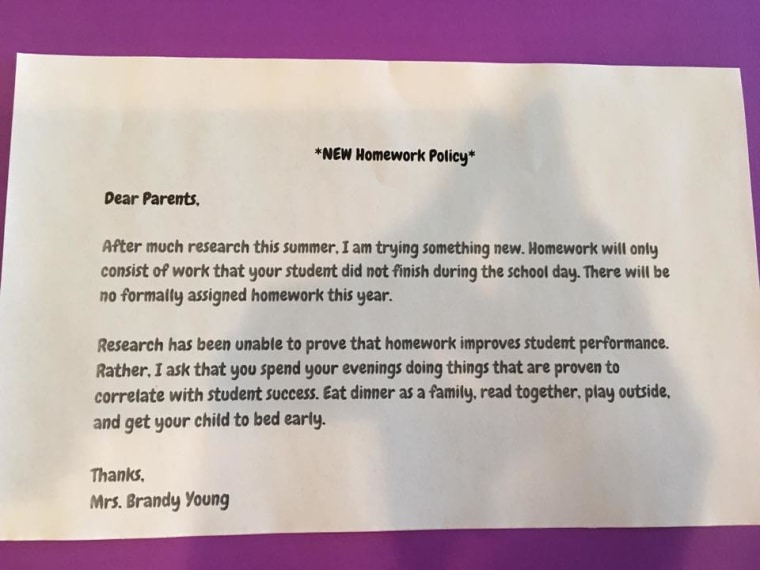
Two years later, Young is teaching second grade at a new school, A.G. Elder Elementary School in Joshua, Texas. She is still not assigning formal homework — though she has tweaked her policy a lot, she told TODAY Parents, since she wrote that note.
The no homework policy has worked great, she said, but it has been a learning process for her. Young found out that some of her students really do want homework, for one thing. She will also send work home with a child who needs more practice on a specific skill from time to time, but when she does, she communicates with the parent and sends an answer key to ensure the practice will be effective.
"Also, not assigning homework doesn’t change the fact that the kids who need extra practice the most usually don’t have the necessary support at home," said Young, who has three young boys of her own with her husband Klint. "It’s a battle that educators are used to fighting, and it isn’t going away any time soon."
Never miss a parenting story with the TODAY Parents newsletter! Sign up here.
Young said her experiences in the classroom for the past two years have only reinforced the idea that effective teaching is all about relationships.
"I want my students to know that I care about them at every second," she said. "I want parents to trust me and let me into their family. I want open communication lines between us so that I can better understand their children and help them succeed."

For that to be possible, Young said, "Student work, regardless of when and where it's done, should be meaningful, engaging, and relevant. No packets ever. Period." Her second grade students approach learning enthusiastically as a result — even at a Title 1 school where nearly 70 percent of the students are eligible for free or reduced lunch prices.
"Kids can conquer mountains when given encouragement, choices, and support!" said Young. "They want and need to be nurtured as a whole child. I believe the no-packet theory supports that effort."
Young was not the first nor the last teacher to implement a classroom policy eliminating homework. In 2017, Marion County, Florida, School Superintendent Dr. Heidi Maier announced she was banning homework for the 31 elementary schools throughout her school district. At the time, Maier said her plan called for "no traditional homework, no work sheets, no endless pages of workbooks. Instead, our children are reading aloud with their parents at least 20 minutes a night.”
A year later, the Ocala Star Banner reported that under pressure from her teachers — 86 percent of whom did not support the ban — and school board members who called the policy "micromanaging" and blamed poor test results in part on it, Maier loosened the guidelines. She is asking that any homework be "meaningful" and not "busy work."
However, Alfie Kohn, author of "The Homework Myth," told TODAY Parents, "It is important to realize that no research has ever found any advantage to any kind of homework before kids are in high school — and newer studies are questioning whether it's necessary even in high school."
Kohn — who has written 14 books covering parenting and education and lectures on those topics at universities, parenting groups, and corporations — is a well-known critic of homework. He said that though some defend the concept of homework as having non-academic advantages like teaching kids responsibility, work habits, or independence, "To the best of my knowledge, not a shred of evidence supports those claims."
What evidence does show, he said, is the disadvantages of homework, some of which parents are already familiar. "It causes frustration, unhappiness, and family conflict; it often makes children less excited about learning and leaves them with less time to pursue other interests and just enjoy their childhoods," he observed.
"But we seem to assume it's worth it to force them to work a 'second shift' after they get home from a full day in school," he said. "We take on faith that the academic benefits must outweigh the substantial costs."
Though many parents support homework, others say they would love for their children's teachers to adopt no-homework policy. Omaha, Nebraska mom Ashley Austrew said she is relieved her first grade daughter has less homework this year than she did in kindergarten.
"Her only homework is whatever she doesn’t get done in class, which I believe is the teacher’s way of saying she doesn’t give homework," she told TODAY Parents. "I am a fan of no homework policies because I think its mostly busy work at this age level and they work hard enough all day."
Julie Burton from Overland Park, Kansas, said she gets annoyed with her fourth grade daughter's math homework even though it is usually just one sheet a night. "If she ever has a question, sometimes we are stumped too," she said. "I feel bad emailing a teacher in the evenings. I’m slightly annoyed at homework in general because I don’t know what the teacher taught."
Kohn said that even small amounts of homework can still be frustrating and damaging to children's attitudes about learning for reasons like Burton's. "The bottom line is that research fails to support the practice of giving any amount or any kind of homework to a 12-year-old, let alone to a 6-year-old," he said. "Making kids unhappy about learning is more likely to undermine than to promote academic excellence."
He encouraged parents to speak up on behalf of their children. "If your child's teacher never assigns homework, take a moment to thank them for doing what's in your child's best interest — and for acknowledging that families, not schools, ought to decide what happens during family time," he added. "If your child is getting homework, organize a bunch of parents to meet with the teacher and administrators — not to ask, 'Why so much?' but, given that the research says it's all pain and no gain, to ask, 'Why is there any?'"
More Back to School

Jenna Bush Hager shares how she helps her kids with first day of school nerves

See Hoda Kotb’s daughters hug it out in adorable video from first day of school post

This kindergarten teacher’s sweet note made one mom cry

After my daughter beat cancer, I wanted to control her entire life. Then she went to college

78 back-to-school quotes that are an A+

I dropped off my first child at college: Here are 7 things I wish I had known

16 back-to-school food deals worthy of an A+
Restaurants.

81 inspirational teacher quotes to show your appreciation

What is ‘redshirting’? Why parents are delaying when their kids start kindergarten

I wasn’t anxious about back-to-school because of my kids. It was the other moms
- Search Please fill out this field.
- Newsletters
- Sweepstakes
- Raising Kids
Yes, You Can Opt Your Kids Out of Homework—Here’s How
One mom says her kids haven't been doing homework for years. Here's how she opted them out and what experts say.
Guille Faingold / Stocksy
When Juliana Porter thinks about the feeling that homework induces, one word comes to mind: dread. With afternoon and evening time constraints, the North Carolina mom of three wants her kids to have some time to relax and unwind, so homework is often pushed until during or after dinnertime.
“The subject we’ve found to be the most challenging is math, in large part because strategies and ‘show your work’ are often required to get correct answers,” says Porter. “But as parents who are not in the class to learn new methods, we’re not able to help. Or we can help, but it’s not the correct method being taught and adds to our child’s confusion. These at-home cram sessions usually end in frustration for both child and parent.”
The Porter family’s experience isn’t unique. Research published in the Child & Youth Care Forum found more than 25% of parents and kids say homework “always or often interferes with family time and creates a power struggle,” while more than 36% of kids say homework sometimes forces them to get less sleep in grades 3 to 6. According to Stanford research , 56% of students surveyed say homework is a primary source of stress.
While many families do their best to help their children complete homework with as little frustration as possible, my family has chosen a different option: to simply skip it. And I don’t mean just skipping it on the nights it's difficult either. For four years, my family has totally opted out of homework, which I’ve learned doesn’t produce enough benefits for the stress it causes. And I want other parents to know that opting out of homework is an option for their kids, too.
Homework: How to Opt Out
If your child goes to an open admissions public school, opting out of homework can be something you consider. While it may be a particularly good choice if homework is causing major household stress, you don’t have to wait until your child is miserable to act if they (or you) would simply prefer to spend the time in other ways. There are no legal requirements that students complete work outside of school hours and, for many children, the actual determinants of homework outweigh the theoretical benefits.
To opt out, I send a note to each of my children's teachers at the beginning of the year letting them know that my child will not be completing homework, that their overall grade should not be impacted, and that they should not be penalized in any way for not turning in homework assignments.
I also let them know that we're committed to our kids' education, that we read together most evenings, and that, if my child is struggling or needs extra support in any subject, we're happy to brainstorm solutions to help them get the practice they need. Though no teachers have pushed back yet (and several have told us they wish they were not required to assign homework and that more families knew they could opt out), we have a small folder of research on the detriments of homework that we could share with an administrator if needed.
Opting out has worked well for our family but implicit bias might mean that other families don't receive the same neutral or positive reaction that our white family does.
"Many minoritized and historically marginalized families never consider opting out of homework, even when they know that it's not meaningful," says Sequoya Mungo, Ph.D. , an educational equity consultant and co-founder of BrownLight Inc. , a company helping to create positive diversity and inclusion results in educational, nonprofit, and corporate environments. "When white families make these types of educational choices, they are viewed as forward-thinking and seen as advocates for their children's education. Teachers and others often think that they're being proactive and identifying other enrichment opportunities for their kids. When non-middle class and non-white families opt out, the assumption is that parents don't value education and don't want to, or are unable to, help their kids with homework.”
According to Dr. Mungo, coming with research or policy can be helpful as even some school level administrators are unaware that opting out is within your rights as parents. “The more prepared you are, the more likely you are to not be met with pushback.”
Why Families May Want to Opt Out of Homework
Since homework is so prevalent, many assume it's vital, or at least important, to kids' academic growth. But the reality is murkier. "There's really no good evidence that homework completion positively impacts kids' academic growth or achievement," says Samantha Cleaver, Ph.D. , a reading interventionist and author of Raising an Active Reader: The Case for Reading Aloud to Engage Elementary School Youngsters .
A 2006 meta-analysis of homework and achievement found moderate correlation in middle school and little correlation in elementary school, while there was negative correlation (that is, more homework means less learning) in third grade and below.
While research shows homework can help high school kids improve grades, test results, and likelihood of going to college, the reality is academic pressures in the U.S. have increased over the last two decades, and so too has the amount of homework that kids are assigned. The National Education Association (NEA) recommends no more than 10 minutes of homework per night per grade level, but that's often not what's happening. According to a 2015 study, elementary school students are being assigned more than is recommended , sometimes almost triple the amount. And, often, even when educators are assigning homework they think falls in this window, it can take some students, particularly those who are “behind” already or who have learning disabilities, much more time to complete.
Excessive homework can negatively impact sleep, mental health, and stress levels. It’s also important to note homework is an issue of equity, since not every child has the same opportunities at home. "When kids are doing work in school, the classroom environment serves as somewhat of an equalizer,'' says Dr. Mungo. "Kids have access to the same teacher and generally the same resources within the classroom setting. At home, kids have different environments, different access to resources, and different levels of support." This means kids with less support and more challenges often end up getting lower grades or being penalized for not turning in work for reasons totally outside their control.
Making Change on Homework
Parents who don't want to be the only ones opting out can work to change the homework culture at their school. Consider reaching out to your principal about your homework concerns or connecting with other parents or the PTA to help build support for your cause.
And if you do opt out, don't be shy about letting other parents know that's what you've chosen to do. Sometimes just knowing there is an option and that others have opted out successfully can help families decide what's right for them.
What to Do With the Extra Time
When Porter thinks about what a life without homework would be like, she envisions a much more relaxed evening routine. “I imagine a scenario where my kids can do their after-school activities, read more, get outside, and generally just decompress from the daily eight-hour grind that is school with no more dread and no more crying,” she says.
If you opt out of homework and find your family with more time for other sorts of learning, leisure, or adventure, be thoughtful how you’ll structure your new routine and talk with your kids about the value of doing nothing, the importance of family time, or how to spend their time in ways that matter to them.
And if you want to be sure they're getting in some valuable post-school learning, consider repurposing your previous homework time to reading with your kids. "Reading aloud has benefits long after your kids can read on their own," says Dr. Cleaver. "Encourage them to choose books about subjects they're interested in, snuggle up together, and enjoy watching them learn through active reading."
But reading isn’t the only way to reap benefits. "There are lots of things that kids can do after school that will positively impact their growth and development that don't involve sitting down to do more of the work they've done at school,'' says Dr. Cleaver. "Time to decompress through play or relaxation isn't just fun, it actually helps kids' brains and bodies relax, making them more open to learning."
Related Articles

Reading & Math for K-5
- Kindergarten
- Learning numbers
- Comparing numbers
- Place Value
- Roman numerals
- Subtraction
- Multiplication
- Order of operations
- Drills & practice
- Measurement
- Factoring & prime factors
- Proportions
- Shape & geometry
- Data & graphing
- Word problems
- Children's stories
- Leveled Stories
- Sentences & passages
- Context clues
- Cause & effect
- Compare & contrast
- Fact vs. fiction
- Fact vs. opinion
- Main idea & details
- Story elements
- Conclusions & inferences
- Sounds & phonics
- Words & vocabulary
- Reading comprehension
- Early writing
- Numbers & counting
- Simple math
- Social skills
- Other activities
- Dolch sight words
- Fry sight words
- Multiple meaning words
- Prefixes & suffixes
- Vocabulary cards
- Other parts of speech
- Punctuation
- Capitalization
- Narrative writing
- Opinion writing
- Informative writing
- Cursive alphabet
- Cursive letters
- Cursive letter joins
- Cursive words
- Cursive sentences
- Cursive passages
- Grammar & Writing

Download & Print From Only $1.79
Free Worksheets for Kids
| For practicing some math skills, there is nothing more effective than a pencil and paper. Our free math worksheets for grades 1-6 cover math skills from counting and basic numeracy through advanced topics such as fractions and decimals. | |
| Use our reading comprehension worksheets to improve reading skills. Free stories followed by exercises, as well as worksheets on specific comprehension topics. | |
| Our printable preschool and kindergarten worksheets help kids learn their letters, numbers, shapes, colors and other basic skills. | |
| Our vocabulary worksheets provide vocabulary, word recognition and word usage exercises for grades 1-5. | |
| Our spelling worksheets help kids practice and improve spelling, a skill foundational to reading and writing. Spelling lists for each grade are provided. | |
| Learn about the parts of speech, sentences, capitalization and punctuation with our free & printable grammar and writing worksheets. | |
| Our free science worksheets Introduce concepts in the life sciences, earth sciences and physical sciences. Currently we have kindergarten through grade 3 science worksheets available. | |
| Kids can practice their handwriting skills with our free cursive writing worksheets. | |
| Free math flashcards and reading flashcards. |

What is K5?
K5 Learning offers free worksheets , flashcards and inexpensive workbooks for kids in kindergarten to grade 5. Become a member to access additional content and skip ads.

Our members helped us give away millions of worksheets last year.
We provide free educational materials to parents and teachers in over 100 countries. If you can, please consider purchasing a membership ($24/year) to support our efforts.
Members skip ads and access exclusive features.
Learn about member benefits
This content is available to members only.
Join K5 to save time, skip ads and access more content. Learn More

New Trend: No Homework for Elementary Students
Research shows less is more..
Posted August 1, 2017
Homework may be the greatest extinguisher of curiosity ever invented - Alfie Kohen, author of The Homework Myth
Sweeping our country is a new trend, which I love: No homework! Many parents are singing the praises of these policies, which remove the nightly nagging of “Have you done your homework?” Plus it frees up time where parents can genuinely connect with their child whether over dinner, or gardening in the backyard without the stress of impending schoolwork. Of course, the no homework program isn’t for every principal although I really think in early elementary school there’s no downside and research even reveals that, too!
Studies show
In 2006, Harris Cooper shared his meta-analytic study, which found homework in elementary school (K-5th grade) does not contribute to academic achievement. Said differently: Homework has become just busy work in the United States, and children aren’t learning anything additional from it. And let’s be honest, at one point a child’s homework becomes a parents homework and even I’m regularly guilty of pulling my calculator out to double check my child’s work. But Cooper’s study isn’t black and white: There were modest gains for middle and high school students, so it looks like the developmental window of early childhood is the place where homework isn’t necessarily beneficial.
Recently, Heidi Maier, the new superintendent of Marion County in FL, which has 42,000 students made national news because she not only is banning homework, but is replacing it with 20 minutes of reading per night. Studies clearly show that young students gain from reading nightly, being read to and picking books of interest to them. Mark Trifilio, principal of the Orchard School in VT, eliminated HW last year and suggested replacing it with nightly reading, playing outdoors or even eating with your family. He reports students haven’t fallen behind, but now they have “time to be creative thinkers at home and follow their passions” ( The Washington Post , Feb 26, 2017).
The subtext of a “no homework” policy in elementary schools is saying: We trust our teachers, we trust the curriculum, and we trust our students to pay attention as well as learn during the day. No homework for kindergarten through fifth grade doesn’t erase learning, but helps students tolerate an often long day better and encourages them to pursue their unique interests after-school from reading and writing to taking photographs. Abbey, age nine, is one of my child client’s without homework and she’s created a website to share her “nature photos through her eyes.”
Counterintuitive classrooms
Western societies often think “more is better” but when it comes to homework the exact opposite may be true for young and perhaps even older children. A study conducted at Stanford University in 2013 showed the amped up stress and physical ailments high school students face especially when spending too much time on their homework. So perhaps a “no homework” policy early-on can position students to find balance in their lives, which can serve them later on. I especially love replacing homework with reading because I’ve seen firsthand the benefits of reading with a child, and how books open a child’s mind to new worlds whether it’s Hogwarts or the Ice Age. And after all isn’t the point of childhood to have fun and learn in a multitude of ways?
By Maureen Healy
Maureen Healy writes and speaks widely on the subjects of children’s emotional health, education and parenting . She also continues to work directly with children and their parents globally. To learn more about her books, sessions or programs: www.growinghappykids.com or @mdhealy
The Washington Post – July 17, 2017 Why this superintendent is banning homework – and asking kids to read
The Washington Post - February 26, 2017 What happened when one school banned homework – and asked kids to read and play instead
Healthline – April 11, 2017 Is too much homework bad for kids’ health?
CBS News – Sept 26, 2016 Growing number of elementary schools now homework free
The Battle Over Homework by Harris Cooper (2007)

Maureen Healy is an author, speaker and expert working with parents, teachers and children globally. Her most recent book is The Emotionally Healthy Child.
- Find a Therapist
- Find a Treatment Center
- Find a Psychiatrist
- Find a Support Group
- Find Online Therapy
- International
- New Zealand
- South Africa
- Switzerland
- Asperger's
- Bipolar Disorder
- Chronic Pain
- Eating Disorders
- Passive Aggression
- Personality
- Goal Setting
- Positive Psychology
- Stopping Smoking
- Low Sexual Desire
- Relationships
- Child Development
- Self Tests NEW
- Therapy Center
- Diagnosis Dictionary
- Types of Therapy

It’s increasingly common for someone to be diagnosed with a condition such as ADHD or autism as an adult. A diagnosis often brings relief, but it can also come with as many questions as answers.
- Emotional Intelligence
- Gaslighting
- Affective Forecasting
- Neuroscience
- Toggle Accessibility Statement
- Skip to Main Content

Statement on the no-homework policy bills
PASIG CITY, August 28, 2019 – With its issuance of the “Guidelines on Giving Homework or Assignment to All Public Elementary School Pupils,” otherwise known as DepEd Memorandum No. 392, series 2010, the Department of Education (DepEd) reiterates its commitment to the holistic development of learners inside and outside the classroom.
The said issuance aims to enable learners to have more quality time with their parents, family, and friends by limiting the homework/assignment to a reasonable quantity on school days and by eliminating the same during weekends.
It is in this regard that the Department supports the no-homework policy proposed by legislators from the House of Representatives. By ensuring that they complete all assignments and projects in school, the no-homework policy enables our learners to find balance between their academic development and personal growth by having ample time for enjoyable activities with family.
The Department will further study the other provisions of the bills to determine the repercussions on the current teaching and learning process.

IMAGES
VIDEO
COMMENTS
Examining these arguments offers important perspectives on the wider educational and developmental consequences of homework practices. 1. Elevated Stress and Health Consequences. According to Gitnux, U.S. high school students who have over 20 hours of homework per week are 27% more likely to encounter health issues.
A Massachusetts elementary school has announced a no-homework pilot program for the coming school year, lengthening the school day by two hours to provide more in-class instruction. "We really ...
According to research by education expert Harris Cooper, who conducted a comprehensive review of educational research, the benefits of homework for elementary students are virtually non-existent. Cooper's findings suggest that while homework may have some positive impact for older students, particularly in high school, we do know there is no ...
A 2015 study published in The American Journal of Family Therapy suggested that elementary students were being assigned significantly more homework than what is recommended. (The National Education Association and the National Parent Teachers Association endorse the "10-minute rule," which states that that students should do no more than 10 ...
For older students, Kang says, homework benefits plateau at about two hours per night. "Most students, especially at these high achieving schools, they're doing a minimum of three hours, and it's ...
Homework is more harmful than helpful to families. Long sees another upside of elementary homework, saying, "It helps families be aware of what their children are learning in the classroom ...
The following year, the superintendent of a Florida school district serving 42,000 students eliminated homework for all elementary students and replaced it with twenty minutes of nightly reading ...
Homework does not help younger students, and may not help high school students. We've known for a while that homework does not help elementary students. A 2006 study found that "homework had no association with achievement gains" when measured by standardized tests results or grades. [7]
Homework just isn't that beneficial. Repeat after me: There is no conclusive evidence that homework improves student achievement. The research (not to mention how it gets interpreted) is mixed at best. But what stands out to me from the research is this: There is no correlation between academic achievement and homework for elementary students ...
To estimate an appropriate amount of time for students to spend doing homework, educators may use "the 10-minute rule" which means multiplying a child's grade level by 10 minutes of homework a ...
A study conducted at Stanford University in 2013 showed the amped up stress and physical ailments high school students face especially when spending too much time on their homework. So perhaps a ...
Yes, and the stories we hear of kids being stressed out from too much homework—four or five hours of homework a night—are real. That's problematic for physical and mental health and overall well-being. But the research shows that higher-income students get a lot more homework than lower-income kids.
Burton Valley Elementary School in Lafayette, Calif., has eliminated homework in grades K through 4. Henry West Laboratory School , a public K-8 school in Coral Gables, Fla., eliminated mandatory ...
However, the correlation between student achievement and homework given to elementary students is inconclusive. Most research only supports homework for middle and high school students (Cooper 1989a; Kohn 2006). There are also non-academic reasons for assigning homework. Corno and Xu (2004) discovered that homework fosters independence ...
Importance Of Homework Essay. Above all, homework allows the students to gain responsibility, time-management, perseverance, and self-esteem. "The act of completing homework has benefits in terms of developing good habits in students.". This shows that, students are gaining many skills from homework.
The results, although somewhat mixed, generally conclude that homework provides no advantage for kids in elementary grades. As children get older, the potential benefits of homework grow, but less ...
Two years later, Young is teaching second grade at a new school, A.G. Elder Elementary School in Joshua, Texas. She is still not assigning formal homework — though she has tweaked her policy a ...
According to a 2015 study, elementary school students are being assigned more than is recommended, sometimes almost triple the amount. And, often, even when educators are assigning homework they ...
September 8, 2016 at 4:33 p.m. EDT. Second-grade teachers at Taylor Elementary School in Arlington, Va., had an idea: Look at the research on how homework affects young students and do what it ...
K5 Learning offers free worksheets, flashcards and inexpensive workbooks for kids in kindergarten to grade 5. Become a member to access additional content and skip ads. Free worksheets for kindergarten to grade 5 kids. Over 10,000 math, reading, grammar and writing, vocabulary, spelling and cursive writing worksheets.
A study conducted at Stanford University in 2013 showed the amped up stress and physical ailments high school students face especially when spending too much time on their homework. So perhaps a ...
PASIG CITY, August 28, 2019 - With its issuance of the "Guidelines on Giving Homework or Assignment to All Public Elementary School Pupils," otherwise known as DepEd Memorandum No. 392, series 2010, the Department of Education (DepEd) reiterates its commitment to the holistic development of learners inside and outside the classroom. The said issuance aims to enable learners to have more ...
50 Absolutely Free Student Rewards: Classroom Incentives. Here you will find 50 absolutely free student rewards and incentives to use with individual students or with the entire class. As a teacher, you understand the importance of positive reinforcement in your classroom, and one way of doing so is by using free incentives.
I f you are looking for a way to earn money remotely helping kids with homework, I have a list you will want to check out. There are several companies now that pay tutors and teachers to help ...